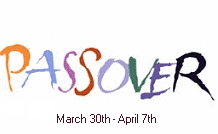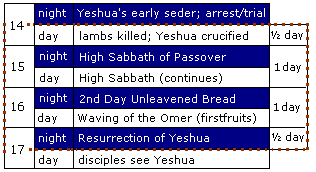|
Jewish Holiday Calendar
For March 2018 site updates, please scroll past this entry....
Spring is the start of the Biblical Year and is marked by two of the Shelosh Regalim (three annual pilgrimage festivals): Pesach (Passover) and Shavuot (Pentecost). The holiday of Shavuot is held seven weeks (or fifty days) following the morning after Pesach.
The Spring Holidays:
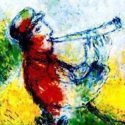
The spring holidays provide a portrait of the death, burial, and resurrection of the Messiah: Yeshua was crucified on erev Pesach, buried during Chag Hamotzi, and was resurrected on Yom Habikkurim (Firstfruits). Shavuot (i.e., the feast of Pentecost) was the day the Ruach HaKodesh (Holy Spirit) came to believers in fulfillment of the promise given by our Lord.
Note that in accordance with tradition, the following holiday dates begin at sundown:
- Month of Adar (Wed., Feb. 14th [eve] - Fri. March 16th [day])
- Month of Nisan (Fri., March 16th [eve] - Sat. April 14th [day])
- Month of Iyyar (Sat. April 14th [eve] - Mon. May 14th [day])
- Month of Sivan (Mon. May 14th [eve] - Tues. June 12th [day])
Note: The holiday of Passover -- and particularly the Festival of Firstfruits -- does not occur contemporaneously with the traditional date of "Easter" or "Resurrection Sunday" as it is often called in the Gregorian calendar... For more information, see the Calendar Pages....
Dates for Passover 2018:
Free Seder Guide
March 2018 Site Updates
Note: If any page content appears to be missing, click: refresh the page...
The Meaning of Holiness...
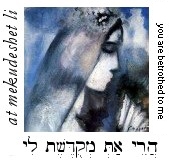
03.30.18 (Nisan 15, 5778) "For I am the LORD who brought you up out of the land of Egypt to be your God. You shall therefore be holy, for I am holy" (Lev. 11:45). Because we are God's people, his redeemed children, we should be holy, just as God is holy (1 Pet. 1:15-16). Holiness, however, is not a matter of what you do (such as wrapping yourself in religious rituals) but instead is a matter of what you "allow" to happen: You let go and allow yourself to be rescued and taken up from the "depths of Egypt" to be with God. Holiness is something you receive by faith; it is a gift of being "set apart" to be sacred and beloved by God. Genuine holiness (i.e., kedushah) is connected with love and grace... Keep THAT feast within your hearts, chaverim, to understand the depths of Passover...
In Hebrew, the word kedushah (קְדוּשָׁה) means sanctity or "set-apartness" (other Hebrew words that use this root include kadosh (holy), Kiddush (sanctifying the wine), Kaddish (sanctifying the Name), kiddushin (the ring ceremony at a marriage), and so on). Kadosh connotes the sphere of the sacred that is radically separate from all that is sinful and profane. As such, it is lofty and elevated (Isa. 57:15), beyond all comparison and utterly unique (Isa. 40:25), entirely righteous (Isa. 5:16), glorious and awesome (Psalm 99:3), full of light and power (Isa. 10:7), and is chosen and favored as God's own (Ezek. 22:26).
After the LORD split the sea and led his people across, Israel sang a song of praise to Him. Shirat Hayam (the Song of the Sea) is an "antiphon", or song of response to the loving deliverance given by the LORD (Exod. 15:1-21). "The LORD is my strength and my song, and he has become my salvation; this is my God, and I will praise him, my father's God, and I will exalt him..." "Who is like you, O LORD, among the gods? Who is like you, majestic in holiness, awesome in glorious deeds, doing wonders? You have led in your steadfast love the people whom you have redeemed; you have guided them by your strength to your holy abode... You will bring them in and plant them on your own mountain, the place, O LORD, which you have made for your abode, the sanctuary, O Lord, which your hands have established."
Note further that the opening statement, "Then they sang" is actually in the future tense: "Then they will sing," which refers to the coming of Messiah. Indeed, in Revelation 15:3 we read that the song will indeed be sung to the Heavenly Bridegroom in the coming New Jerusalem... Note also that in the closing phrase of the song, "the LORD will reign forever" (Exod. 15:18), the word "will reign" (יִמְלךְ) is spelled with a missing Vav, which suggests the Messiah Yeshua. The LORD will indeed reign when the rightful heir to the throne of David and the true King of Israel soon appears. Then shall we be with our Beloved forever and ever.
Note: Tomorrow is our beloved son Judah's ninth birthday! Please offer up a prayer for this boy to become a man of God who will serve the LORD our God. Thank you!
 |
 |
Passover: Who knows 15?
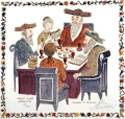
[ The following is related to the holiday of Passover which begins this evening at sundown... ]
03.30.18 (Nisan 14, 5778) Many of us are familiar with the connection between Passover and the number four. There are four "special Sabbaths" that precede the festival, and the holiday itself has four names: Chag Ha-Pesach (the holiday of the Passover [Num. 9:2]); Chag HaMatzot (the holiday of Unleavened Bread [Exod. 12:17-20]); Chag Ha-Aviv (the holiday of spring [Deut. 16:1]), and Z'man Cheiruteinu (the Season of our Freedom). During the seder, we partake of arba kosot ("four cups"), ask arba kushiyot ("four questions"), discuss arba Banim ("four sons"), and so on. However, it has been noted by various sages that the number fifteen is also connected to this holiday. There are 15 Steps to the traditional Passover Seder, which is held exactly 15 days into the first month of the Jewish year (i.e., Nisan). The famous "Song of the Sea" (i.e., Shirat Hayam: שִׁירַת הַיָּם) - which thanks God for the Exodus from Egypt - is found in the 15th chapter of the Book of Exodus, which was crafted by the scribes so that its center column has exactly 15 "steps" of text:
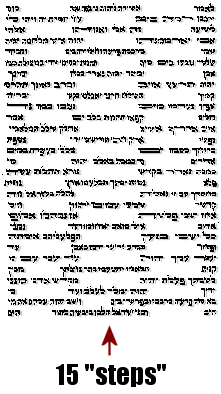
The Divine Name YAH (יה) - which first occurs in the Scriptures in the "Song of the Sea" (Exod. 15:2) - equals 15 in Hebrew gematria, and during the seder meal there are 15 things for which we sing Dayenu (i.e., דַּיֵּנוּ: "it would have been enough"). Furthermore, there were 15 steps on the south side of the Temple Mount, leading up to the Temple, and 15 psalms (120-134) that sung by the Levites as "Songs of the Steps." There are also 15 words uttered in the Priestly Blessing (Birkat Kohanim).... 15 is also the number of completion (7) combined with the number of grace (8), indicating the plan of God's redemption for the ages.
The Meaning of Life...

[ Some people live in dread of God, fearing his disapproval and rejection, but the Voice of the Spirit is "Live in Me..." "I AM with you," "I AM for you..." Amen: God is love and light and truth. Those religions that regard God as a slave master do not know the heart of the Heavenly Father... ]
03.29.18 (Nisan 13, 5778) The Hebrew word for "life" is chayim (חַיִּים), a plural noun that contains two consecutive letter yods (יי) that picture two "hands held together" (the Hebrew word yad [יָד] means "hand"), or the union of our spirit with God's Spirit. The word itself reveals that there is no life apart from union with God, who extends his hand to you and says, "Live in me" (John 15:4). Live in God, who is your life, your Beloved, your light, your truth, your healing, your beauty, your breath, and your salvation. Yeshua is the Source of all life, and we find nourishment, strength, and fullness of joy as we connect with his life. The Lord is our light and our salvation, the Mediator of divine life (Psalm 27:1; John 1:4). The Voice of the LORD still speaks: "Take heart. It is I; be not afraid."
Likewise the Hebrew word for "beloved" is yedid (יְדִיד), which comes from the word dod (דּוֹד), as used in the verse ani le'dodi ve'dodi li (אֲנִי לְדוֹדִי וְדוֹדִי לִי), "I am for my beloved and my beloved is for me" (Song 6:3). The name "David" (דָוִד) also comes from this root. It is interesting to see that the word yedid is similarly formed by combining or joining the Hebrew word for "hand" (i.e., yad: יָד) together (i.e., יָד+יָד), which pictures two friends walking together yad b'yad (יָד בְּיד) - while holding hands...
The Hebrew word for life, i.e., chayim (חַיִּים), can also be read as chai (חי), "alive," combined with the particle im (אם), "if," suggesting that being alive is conditional on our connection with God in the truth. "Whoever believes in the Son has eternal life (חַיֵּי עוֹלָם); whoever refuses the Son shall not see life, but the separation of God remains" (John 3:36). Life and peace are therefore inextricably connected, and those who refuse Yeshua, the Prince of Peace (שַׂר־שָׁלוֹם), therefore separate themselves from unity with God. Yeshua alone is the means of receiving the divine life: "Whoever has the Son has the life (הַחַיִּים); but whoever does not have the Son of God does not have the life" (1 John 5:12).
The Divine Life is such that it is never diminished as it shared but instead grows and multiplies in miraculous ways. This is alluded to by the Hebrew word for love (i.e., ahavah: אהבה), the gematria of which is thirteen (1+5+2+5=13), but when shared with another it is multiplied: 13 x 2 = 26 - the same value for the Sacred Name (יהוה), i.e., (10+5+6+5=26). The love of God given in Yeshua is the very life of the universe...
The word chayim is also written in the plural to indicate that each person potentially contains a "universe of lives" within him or her. Spiritually, your soul is a unity that contains a multiplicity of changes, yet remains a distinct identity. Physically, when Cain murdered his brother Abel, it is written, "the voice of your brother's bloods (plural) cries out from the ground" (Gen. 4:10), indicating that Abel's descendants also cried out. In light of this the Talmud states, "Whoever destroys a soul, it is considered as if he destroyed an entire world; and whoever saves a life, it is as if he saved an entire world" (Sanhedrin 37a).
Personal Note: Please remember this ministry in your prayers, friends: we really need your help! My middle son Judah's birthday is on the first day of Passover week, too (he will be nine, can you believe it?). Thank you for your prayers for him. Shalom to you!
 |
Recent Website Challenges...
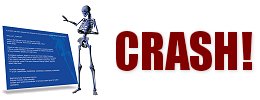
03.28.18 (Nisan 12, 5778) I mentioned recently that I have been experiencing a lot of problems with my web hosting server, the software I use to develop this site, and repeated computer crashes. To give you some idea of what's been happening, certain pages on this site have mysteriously been defaced, sometimes repeatedly... For example, certain pages concerning the Passover Seder - such as those explaining the meaning of the Afikomen, the significance of the new covenant, etc., - all have been defaced (i.e., the graphics "smeared" and sometimes removed, the links broken, the text garbled). It's bizarre and seemingly sinister that often the pages that get corrupted are those that most clearly enunciate the truth of the gospel message. I see this over and over again, sometimes right after I test the pages on several browsers to ensure that the content loads correctly, etc. It's exhausting to redo these pages over and over again, and it interferes with my other work on the website. Here's another example: the links for the Hebrew for Christians free Passover Hagaddah were all mysteriously broken, even though I had tested them about 2 weeks ago as I updated the PDF file... It's a daily battle to keep the content from being removed or made inaccessible! At any rate, God is in control and I will trust him for all of this.
Please note, however, that since this website does not use tracking "cookies" or ask you for any personal information, your browsing experiencing here is safe, though if you encounter broken or defaced pages, please send me an email so I can fix the issues. Thank you!
 |
Intimacy of Passover...
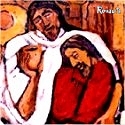
03.28.18 (Nisan 12, 5778) Unlike the rituals and practices of organized "religion," the Passover Seder takes place at home, not in a sanctuary, and may be conducted by anyone, not by professional clergy or a rabbi... The heart of the seder is shared meal celebrating our connection with family, our friends, the "called out" people of God who take refuge in his promises. Such intimacy is altogether fitting, since Passover was foreshadowed in the original paradise, was prophetically and poignantly re-enacted by Abraham's sacrifice of Isaac, and was later affirmed by Israel at the time of the Exodus. In each case the blood of the lamb is central: to cover the shame of Adam and Eve's transgression; to express the heart of God's compassion in the substitution of the lamb for Isaac, and for the redemption of the families of Israel during the Passover. Most of all, however, the Passover Seder foretells and recalls the sacrifice of Yeshua on our behalf as the great Lamb of God who delivers us from our slavery to sin. Therefore heed the Torah's general rule about the holidays: "You shall rejoice in your festival" (Deut. 16:14) by delighting in the salvation of God, by embracing our family and friends in the sure hope of eternal life. Chag Pesach Sameach, chaverim!
 |
The Very First Passover...
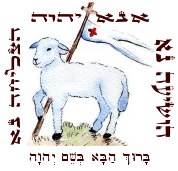
[ The following is related to the holiday of Passover, which begins this Friday March 30th... There is no Passover apart from the blood of the Lamb! ]
03.28.18 (Nisan 12, 5778) Passover is the archetypal picture of the redemption of God. Its theme goes all the way back to the beginning, to the primordial orchard of Eden itself, when Adam and Eve disobeyed God and ate from the forbidden tree. Because of their transgression, our original ancestors incurred the plague of death and were exiled from the Divine Presence, though God graciously promised to heal them through the coming Seed of the woman – the Savior who would crush the head of the serpent and break the fangs of his venomous sting (Gen. 3:15). Soon after making this great promise, God clothed our primordial parents with the skin of a sacrificed lamb (Gen. 3:21), linking their coming deliverance with the "Lamb of God slain from the foundation of the world" (1 Pet. 1:18-20). The very first "Passover" was in the garden. The story extends to the world to come, too, where in the redeemed paradise of God we will celebrate the victory of the Lamb who was slain for our redemption (Rev. 5:12-13, Rev. 19:7).
The great story of our redemption is revealed on two levels in Scripture - one that concerns the paradise of Eden (the universal level), and the other that concerns the paradise of Israel (the particular level). Therefore Yeshua is both rightly called the "Lamb of God who takes away the sins of the world" (John 1:29) and "the Messiah our Passover Lamb who has been sacrificed for us" (1 Cor. 5:7). Likewise he is both called the "Seed of the woman," and "the Son of David"; the "Second Adam," and the "King of the Jews," and so on. The story of Israel's redemption in Egypt therefore serves as an allegory of both the universal salvation promised in Eden (i.e., the lamb slain from the foundation of the world) as well as the revelation of the sacrificial ministry of Yeshua as Israel's promised Messiah. Yeshua is both the Savior of the world as well as Israel's true King and Deliverer.
Note: For more on this subject, please see the articles, "The Very First Passover" and "The Gospel in the Garden."
 |
Your Reason for Being...

03.28.18 (Nisan 12, 5778) "This is the thing that the LORD commanded you to do, so that the glory of the LORD may appear to you: Draw near to the altar and offer your sin offering and your burnt offering and make atonement for yourself" (Lev. 9:6-7). Have you considered why you were born into this world? What is your purpose, destiny, and end? The Torah states that you were personally created by Almighty God, who breathed out the breath of life (נִשְׁמַת חַיִּים) into you, and then redeemed your life so you could know the glory of God and spiritual reality. As it is written: "Worthy are you, our Lord and God, to receive glory and honor and power, for you created all things, and by your desire they existed and were created" (Rev. 4:11). God creates all things for his glory and purposes, which indeed is the first blessing recited over the bride and groom in a traditional Jewish wedding: בָּרוּךְ אַתָּה יְהוָה אֱלהֵינוּ מֶלֶךְ הָעוֹלם שֶׁהַכּל בָּרָא לִכְבוֹדו / "Blessed are you Lord our God king of the universe, who has created all things for his glory." The purpose of life is to know and love God, to walk in His light and truth, and to glorify his compassion and grace forever...
At a traditional Jewish wedding the groom places the ring on his bride's finger and says: Harei, at mekudeshet li (הרי את מקודשׁת לי): "Behold, you are sacred to me." Love and holiness are interconnected, since the beloved is set apart as sacred and treasured. May God help us see the wonder of His love for our lives: "Do not be conformed to the passions of your former ignorance, but as he who called you is holy, you also be holy in all your conduct, since it is written, "You shall be holy, for I am holy" (1 Pet. 1:14-16).
 |
Blessed Need of Heart...

03.27.18 (Nisan 11, 5778) "I need Thee every hour..." More than anything else, God's love is what we desperately need, isn't it? In moments of testing when we feel wounded, alone, unworthy, afraid, and needy; and especially when we succumb to the depths of despair... God's love descends to the depths of our soul - to the very dust of death itself - to hear our cries and to profoundly touch us... Praise the Name of Love - despite everything, God saves us from ourselves, from our worst fears, and from the hell of shame and abandonment. My soul yearns for you in the night; my spirit within me earnestly seeks you (Isa. 26:9). I say to the LORD, "You are my Lord; I have no good apart from you."
אָמַרְתְּ לַיהוָה אֲדנָי אָתָּה
טוֹבָתִי בַּל־עָלֶיךָ
a·mart · la·doh·nai: · A·doh·nai · a·tah
tov·va·tee · bal - a·ley·kha

"I say to the LORD, "You are my Lord;
I have no good apart from you."
(Psalm 16:2)
Hebrew Study Card

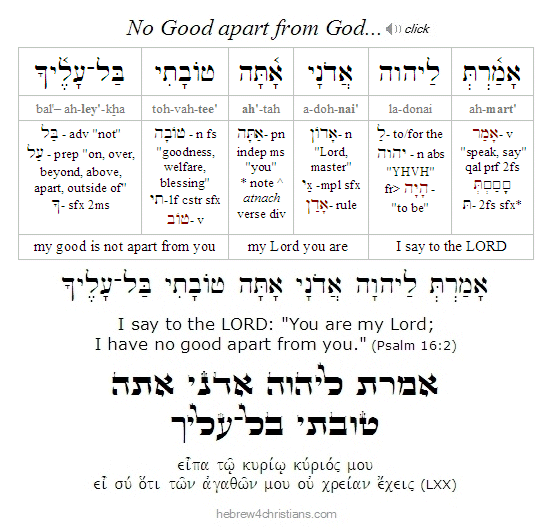
The ongoing need for the LORD is perhaps the highest estate of the human soul, even if it is nevertheless attended with heartsickness and unrelenting longing. It is a great, great gift from heaven to know God as your heart's true desire - to fully understand that your relationship with Him is the ultimate concern and treasure of your existence.
The Limping Messiah...
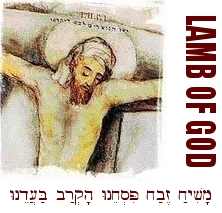
[ The following is related to holiday of Passover, which begins this Friday evening, March 30th... ]
03.27.18 (Nisan 11, 5778) As we prepare our hearts for Passover, recall that the Hebrew verb "pasach" (פָּסַח) can mean not only "to pass over," but also "to limp," suggesting the heel of Messiah that was "bruised" in the battle for our salvation (Gen. 3:15). As it is written, "Just as Moses lifted up the serpent in the wilderness, so must the Son of Man be lifted up, that whoever believes in him may have eternal life. For God so loved the world, that he gave his only Son, that whoever believes in him should not perish but have eternal life (חַיֵּי עוֹלָם). For God did not send his Son into the world to condemn the world, but in order that the world might be saved through him" (John 3:14-17). Humanity as a whole has been "bitten by the snake" and needs to be delivered from its deadly venom. Just as the image made in the likeness of the destroying snake was lifted up for Israel's healing, so the One made in the likeness of sinful flesh was to be lifted up as the Healer of the world (Rom. 8:3). All we need to do is look up and believe...
Some people might object that the verb pasach (פָּסַח) alludes to the wounded Savior, our great Passover "Lamb who was slain" (John 1:29; 1 Pet. 1:19-20; Rev. 5:12; 13:8); however, it is evident that the Hebrew root can mean "to limp" as a result of a wound. Indeed the Hebrew participle pise'ach (פִּסֵחַ) means "lame" or "crippled" (for example, see Lev. 21:18; Deut. 15:21; 2 Sam. 9:13, etc.). Furthermore, there are several uses of the verb pasach that explicitly mean to "limp" or "be lame." For example, in 2 Sam. 4:4 it says: "and he (Mephibosheth) fell and 'became lame" (וַיִּפָּסֵחַ); in 1 Kings 18:21, we read: "how long will you limp (פּסְחִים) between two opinions?" and in 1 Kings 18:26 it is written: "and they (the priests of Baal) 'limped upon the altar" (וַיְפַסְּחוּ עַל־הַמִּזְבֵּחַ) in a pagan ritual dance. In other words there is clearly a connection between Passover and becoming wounded, and this alludes to the Suffering Servant, the Messiah, whose heel was bruised in the battle for our deliverance (Gen. 3:15). Those who wish to argue that pasach cannot refer to the "limping" of the Messiah, the Passover "Lamb of God" who was slain for our sins in the battle against the serpent, therefore have the burden to explain the meaning and usage of the verb pasach in these other verses of the Hebrew Scriptures.
Note: The life is in the blood (Lev. 17:11). There is no Passover without the Lamb (Exod. 12:21) -- the wounded Lamb of God (Rev. 5:21)! For more on this subject see "The Gospel in the Garden" and its related links.
 |
Insanity and Sin...

03.27.18 (Nisan 11, 5778) From the holy Torah we read, "If anyone... goes astray and breaks faith..." (Num. 5:12). The sages comment that the Hebrew for "goes astray" (i.e., tisteh: תִשְׂטֶה) is written so it may also be read as "goes insane" (i.e., tishteh: תִשְׁטֶה), and concludes that sin is a form of insanity, that is, a denial of what is real, and therefore a state of delusion. We are required, of course, to believe that God is knowable (Rom. 1:19-20), that we are always in His presence (Prov. 15:3; Psalm 94:9; 139), that He knows all things (Psalm 147:5), and nothing can be hidden from Him (Isa. 40:28; Jer. 23:24; Heb. 4:13), but when we sin, we "break from" this reality and deny the divine Presence by a perverse act of self-exaltation. Whenever we imagine that we are unseen by God or whenever we "forget" that we live, move, and have our being in His presence, we are denying reality. Our sin causes us lose sight of what's real: we forget who God is; we forget who we are; and we exile ourselves from the Source of life... Surely sin is a form of insanity, and therefore we have a moral and spiritual obligation to think clearly and to value truth.
 |
"The" Question of Passover...
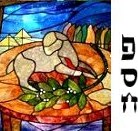
03.26.18 (Nisan 10, 5778) During the Passover seder we begin our retelling the story of the Exodus when the question is sung: "Mah nishtanah ha-lailah ha-zeh mikol ha-leilot?" - What makes this night differ from all other nights? This is "the" central question of Passover, asked for thousands of years, and the answer is always the same: "We were slaves, but God redeemed us from our bondage by the blood of the lamb (דַּם הַשֶּׂה)." Note again that there were not many lambs, but the LORD told Israel: "You shall keep it [i.e., the Passover lamb] until the fourteenth day of this month, when the whole assembly of the congregation of Israel shall slaughter him (אתוֹ) at twilight (Exod. 12:6). Each family put their trust in God's uniquely appointed sacrifice to be delivered from the plague of death (מכת המוות).
מַה נִּשְׁתַּנָּה הַלַּיְלָה הַזֶּה מִכָּל הַלֵּילוֹת
mah · nish·ta·nah · hal·lai·lah · haz·zeh · mik·kol · ha·lei·lot

"What makes this night differ from all other nights?"
Each of us must answer this question posed to the heart...
Heaven's Love Story...

03.26.18 (Nisan 10, 5778) The Scriptures reveal that ultimate reality is a divine love story with a "happy ending," despite the struggles we face in this world. We see this in connection with the great deliverance of the Passover, when we read the story of our redemption in a book called a "haggadah." Note that the Hebrew word "haggadah" (הַגָּדָה) means "retelling," which of course refers to the story of our journey from slavery to freedom by the hand of God's love. With regard to the sanctity of this story, the Torah commands us: "You shall tell (i.e., ve'higadta: וְהִגַּדְתָּ, from which "haggadah" comes) your child on that day, 'It is because of what the LORD did for me when I came out of Egypt.' And it shall be to you as a sign on your hand and as a memorial between your eyes, that the Torah of the LORD may be in your mouth. For with a strong hand the LORD has brought you out of Egypt" (Exod. 13:8-8). The sages note that the numeric value of the word "haggadah" (הַגָּדָה) is the same as the Hebrew word for "good" (i.e., tov: טוֹב), which again indicates that the story of our redemption in the Messiah is truly good – indeed, the greatest story ever told...
מָה־אָשִׁיב לַיהוָה כָּל־תַּגְמוּלוֹהִי עָלָי
כּוֹס־יְשׁוּעוֹת אֶשָּׂא וּבְשֵׁם יְהוָה אֶקְרָא
mah · a·shiv · la'donai · kol-tag·mu·lo·hi · a·lai
kos · ye·shu·ot · es·sa · uv·shem · Adonai · ek·ra

"What shall I render to the LORD for all his benefits to me?
I will take the cup of salvation, and call upon the name of the LORD."
(Psalm 116:12-13)

Hebrew Study Card
Going Home for Passover...
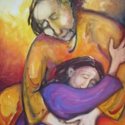
03.26.18 (Nisan 10, 5778) We must be careful not to worship an idol, that is, a false concept of God! It is entirely possible to study the Bible, to go to church or synagogue, and yet worship a pagan god. How so? By not knowing the heart of the Father; by not honoring the One who passionately seeks our healing. We know the Father by the Son, that is, in "the language of Son" (Heb. 1:2; Luke 10:21-24) and in the truth of his passion. Our heavenly Father is eager to forgive and embrace all of his children (John 3:16-17). In Yeshua's famous parable of the "prodigal son," the father saw his wayward child a "long way off" and ran to embrace and kiss him - no questions asked, no explanations needed about his past. When the son nevertheless began reciting his carefully prepared speech of regret and repentance, the father barely listened, and in his overwhelming joy instructed his servants, 'Bring quickly the best robe, and put it on him, and put a ring on his hand, and shoes on his feet. And bring the fattened calf and kill it, and let us eat and celebrate. For this my son was dead, and is alive again; he was lost, and is found...' (see Luke 15:20-25).
Know the heart of the Father... God sees you while you are still "a long way off" (Rom. 5:8). He runs to you with affection when you first begin to turn your heart toward Him. Indeed, God's compassion is so great that He willingly embraces the shame of your sins and then adorns you with "a fine robe, a ring, and sandals." Your Heavenly Father even slaughters the "fattened calf" (Yeshua) so that a meal that celebrates your life may be served.
It is never too late to turn to God... The prophet Jeremiah spoke in the Name of the LORD: "Return, faithless Israel, declares the LORD. I will not look on you in anger, for I am kind (כִּי־חָסִיד אֲנִי), declares the LORD" (Jer. 3:12). When the people drew back in shame, however, God encouraged them by saying "My children, if you return, will you not be returning to your Father? Return, O faithless sons; I will heal your faithlessness. "Behold, we come to you, for you are the LORD our God."
 |
Celebrate God's Love...

[ The following is related to the holiday of Passover, which begins Friday March 30th... ]
03.25.18 (Nisan 9, 5778) Yeshua said the kingdom of heaven could be likened to a king who gave a wedding feast for his beloved son. Those who were invited made one excuse after another why they could not attend, so the disappointed king then instructed his servants to "go out quickly to the streets and lanes of the city, and bring in the poor and crippled and blind and lame... and compel everyone you find to come in, so my house may be filled" (see Luke 14:15-24). God loves people and implores them to personally join in the celebration of his love, to partake of the marriage feast of the Lamb (חֲתֻנַּת של הַשֶׂה; Rev. 19:7). But note that this means that we are willing to bring all the lame, broken, and fearful parts of ourselves to the banqueting table of God's love... The courage to "come to the table" only comes from the conviction that you are welcomed and accepted, that is, by trusting that you are truly made safe by God's love. This is the heart of Passover, after all...
Perhaps we are afraid of God's unconditional love for us because we've experienced rejection or abandonment in our lives. We silently wonder, "What if God lets me down and I get hurt again?" We prefer the "comfort" of our fears to the risk of letting go and trusting in God's love for us, just as we are... This fear shows up in a lot of ways, for instance, by thinking we have to be "religious," or by attempting to clean ourselves up before we can accept God's love, On the other hand, we might entertain a sense of false humility that considers our sin to be too much for God to bear, and thereby excuse ourselves from the celebration.... In every case the problem is the need to control. We want to define the terms of love before we will let go and trust. We are offended at the idea of divine grace because we want to esteem ourselves as worthy of God's love based on who we are, rather than on who God is... The message of God's love, however, is scandalous, precisely because it gives wholeheartedly to those who are undeserving and unworthy, to the tax collectors, the sinners, the crippled and blind and lame... So come just as you are; sit at the table; know that you are welcome.
 |
Passover Torah Readings...

03.25.18 (Nisan 9, 5778) Shavuah tov, chaverim! We are getting very close to the central holiday of Passover, which begins this coming Friday at sundown.... Note that the weekly Torah Reading cycle is suspended for the holiday week of Unleavened Bread (called "Passover Week" in the Jewish tradition), with each day of the week (from Nisan 15 through Nisan 22) assigned additional readings from the Torah and Haftarah.
Because the Jewish calendar is solar-lunar, the dates for each day's readings are not fixed, but vary from year to year. This means that the intermediate days of Passover, called chol hamo'ed (CH"M) will vary from year to year. Remember the day begins at sunset and runs through the following day until 18 minutes before sunset.... To ensure the accuracy of a particular day's readings, always check a good Jewish holiday calendar.
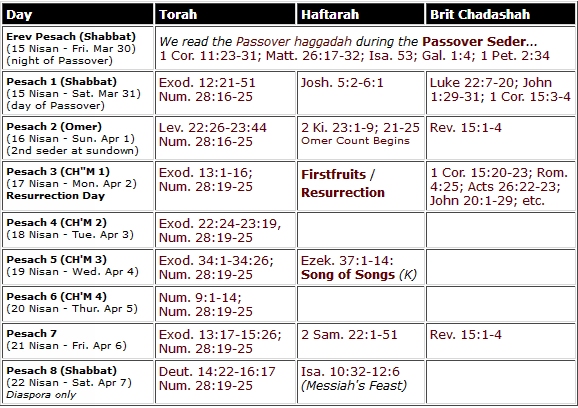
Note: Active links for these readings are given in the Passover Week Readings page.
Confession of our Hope...
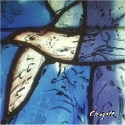
03.23.18 (Nisan 7, 5778) It is written: "Faith is the foundation (i.e., ὑπόστασις: the "substance," reality, being, etc.) of hope, the conviction of the unseen... Without faith it is impossible to please God, for whoever would draw near must believe that God exists and rewards (μισθαποδότης) those who seek him" (Heb. 11:1,6). Note that God is pleased when we seek his presence, that is, when we when we look past the ephemera and ambiguity of the phenomenal world for the truth about spiritual reality. For our part, faith depends on confession. We must say that we believe, and affirm it with all our heart (Rom. 10:9). As it says, "I will make Your faithfulness known with my mouth" (Psalm 89:2). When you encounter tribulation, or experience some crisis of faith, reaffirm aloud: "I believe in God's promise..." Physically expressing your faith is itself an act of faith, and this encourages your soul to trust in God's healing reward even in the present struggle or darkness.
One of the more difficult tests of faith is learning to "endure yourself" as your inner character is being transformed by the mercy of God... To do so, you must receive the miracle of life in Yeshua (1 John 5:12). You must look beyond the realm of appearance, where the "outward man" perishes, to the realm of ultimate healing, where the "inward man" is finally liberated from the ravages of sin and death. This is the comfort we have in our affliction: God's promise revives our hearts to say, "I know that my Redeemer lives, and at the last he will stand upon the earth" (Job 19:25). Even in the "shadow of the valley of death" (i.e., this moribund and broken world), the LORD is with us and comforts us with His Presence (Psalm 23:4). We are given this great promise: "Just as we have borne the image of the man of dust, we shall also bear the image of the man of heaven" (1 Cor. 15:49).
Dear Lord, in the worst of our moments, thank you for seeing the Savior within us; thank you for heeding the groaning of hope that your Spirit of compassion imparts.... "When my heart was embittered, when I was pierced in heart, I was brutish and ignorant; I was like a beast toward you. Nevertheless, I am always with you; You hold my right hand" (Psalm 73:21-23). Despite this lament, however, the psalmist affirmed that he was always with God - notwithstanding his ignorance, his complaint of heart, his doubts, fears, and so on... God is not driven away by our pain and confusion, but on the contrary, he takes us by the hand and will not let go: "It was I who taught Ephraim to walk; I took them up by their arms, but they did not know that I healed them" (Hos. 11:3).
שְׁמַע־יְהוָה קוֹלִי אֶקְרָא
וְחָנֵּנִי וַעֲנֵנִי
she·ma · Adonai · ko·li · ek·ra
ve'chon·nei·ni · va'a·nei·ni

"Hear, O LORD, when I cry aloud;
be gracious to me and answer me"
(Psalm 27:7)

Of course it's not always easy to wait for God, especially when we are in pain or anxiety, but we must never, ever, give up; we must never ever, abandon our heart's longing for ultimate healing. Therefore the Spirit cries out: come alive and trust in the promise of God; receive the heavenly gift. Ve'yesh tikvah le'acharitekh (וְיֵשׁ־תִּקְוָה לְאַחֲרִיתֵךְ): "There is hope for your future," declares the LORD (Jer. 31:17). "Blessed are you, LORD our God, King of the universe, who makes us prisoners of hope" (אֲסִירֵי הַתִּקְוָה). Friends, Let us hold fast the confession of our hope without wavering, for he who promised is faithful" (Heb. 10:23).
"The peace of God, which surpasses all understanding, will guard your hearts and your minds in Yeshua our Messiah" (Phil. 4:7). Shabbat HaGadol Shalom chaverim!
Setting your Focus...

03.23.18 (Nisan 7, 5778) Politicians, advertisers, social activists, and other manipulators understand that when people are afraid, their thinking is compromised, and therefore the propaganda of the world inevitably seeks to incite anxiety, dread, terror, division, and confusion by means of disinformation delivered up through pop culture. The way of healing is therefore to refuse to be bullied by the carefully crafted messages of deception regularly broadcast by the various "princes of this world..." We are not to be ignorant of Satan and his strategies to foment resentment, mistrust, and hatred. We must overcome the power of the lie by consciously focusing on the truth of God and the abiding Reality of the Divine Presence. As King David resolved within his heart: shiviti - "I have set the LORD always before me - because He is at my right hand, I shall not be shaken."
שִׁוִּיתִי יְהוָה לְנֶגְדִּי תָמִיד
כִּי מִימִינִי בַּל־אֶמּוֹט
shi·vi·ti Adonai le·neg·di ta·mid
ki mi·mi·ni bal e·mot

"I have set the LORD always before me;
because he is at my right hand, I shall not be shaken."
(Psalm 16:8)
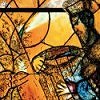
Hebrew Study Card
The Hebrew word shiviti (שִׁוִּיתִי) comes from the verb shavah (שָׁוָה) which means "to set" or place, referring to focus of the heart required to truly apprehend the Divine Presence. In this connection, we note the "korban tamid" (תָּמִידקָרְבַּן) was the sacrifice of a lamb every evening and morning upon the copper altar in the outer court -- the central sacrifice of the Tabernacle. Along with it, matzah and wine offering were required, thereby revealing the true Passover Lamb of God and his sacrifice for us (Exod. 29:38-42). That the lamb was offered twice daily hints at its two applications - the first concerning the great deliverance from Egypt by the blood of the Lamb, and the second concerning the even greater deliverance given through Yeshua, the true Lamb of God (John 1:29). Note also that the constant sacrifice of the lamb required that the fire at the altar would never be extinguished, and by extension, the duty to "care for the inner fire" of the soul. Thank God that the fire that needs tending comes from the Spirit of God within us!
But how are we able overcome our fears apart from heartfelt bittachon (בִּטָּחוֹן), that is by trusting that God is truly "with us"? The LORD is our Good Shepherd (הָרעֶה הַטּוֹב) who leads us on our way and meets our daily needs; He promises to never leave nor forsake us, especially when we are faced with difficult circumstances... There's the place of God - in the midst of the test (1 Cor. 10:13). The antidote to our fear is to find comfort in God's abiding love (1 John 4:18): God saves us from our fears (Psalm 34:4, 2 Tim. 1:7). When we trust that God personally cares for us, we find courage to face whatever may come our way...
"Do not interrupt the flight of your soul; do not distress what is best in you; do not enfeeble your spirit with half wishes and half thoughts. Ask yourself and keep on asking until you find the answer, for one may have known something many times, acknowledged it; one may have willed something many times, attempted it - and yet, only the deep inner motion, only the heart's indescribable emotion, only that will convince you that what you have acknowledged belongs to you, that no power can take it from you - for only the truth that builds up is truth for you." - Kierkegaard
Always the First Step...
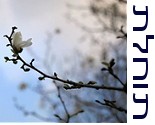
03.23.18 (Nisan 7, 5778) There is a core element of your spiritual life that is all-determinative, that effects everything else, and that is the decision of whether you will choose to "show up," whether you will engage it's hope; and whether you will open your eyes and yield yourself to the light... And this is an ongoing decision. Therefore we read: "If you walk in my statutes (אִם־בְּחֻקּתַי תֵּלֵכוּ) and observe my commandments and do them..." (Lev. 26:3). The sages note that unlike the holy angels, we must "walk out" the faith of our days, and therefore we are always moving either forward or backward. In this world, God's sun shines on the just and unjust alike (Matt. 5:45). Every human being lives by faith of some kind, and it is therefore impossible to opt out of the decision to "choose this day whom we shall serve" (Josh. 24:15). Indifference or apathy is as much a spiritual decision as is outright rebellion, and if we do nothing today to draw us near to the Lord, we will eventually regress and slip backward. This is all very sobering. "No one knows the day or hour," and that's why it is so vital to turn to God and be healed while there is still time. So turn today and bacharta ba'chayim (בָּחַרְתָּ בַּחַיִּים) - "choose life!" "For this commandment (of turning to God) is not hidden from you, and it is not far away... No, the matter is "very near you" (כִּי־קָרוֹב אֵלֶיךָ הַדָּבָר מְאד) - in your mouth and your heart - to do it" (Deut. 30:11-14; Rom. 10:8-13).
 |
Urgent Prayer Request...

03.22.18 (Nisan 6, 5778) Friends, I urge you to pray for this ministry, as I have experienced all sorts of challenges lately, including computer hardware problems, software problems (i.e., crashes when I develop the Hebrew for Christians web site), web hosting issues, audio recording problems, censorship and re-direction issues (from search providers, etc.), financial challenges, and some health-related issues. Yesterday, for example, I spent over 18 hours restoring data on the web site and trying to debug issues causing my software to crash (this is the third time in a month!). As you can imagine this is tiring, but I also lose time I need to do further ministry, writing, etc. Hebrew for Christians has been doing on-line ministry for over 15 years now, with even earlier ministry going back to my years with Zola Levitt Ministries. In all that time, however, the last few months have been the toughest for me, and therefore I earnestly ask for your prayers. Thank you so much. - John
 |
Our Broken Matzah...

03.22.18 (Nisan 6, 5778) During our Passover Seder, we will place three matzahs on the table, said to represent Abraham, Isaac and Jacob, respectively. During the Yachatz step of the seder, the middle matzah (representing Isaac) will be broken to recall how Isaac was sacrificed in obedience to his father, foreshadowing the sacrifice of Yeshua by God the Father. Indeed, the Talmud states, "We break the middle matzah in tribute to Yitzchak (Isaac), who accepted the sins of the people upon himself" (Shabbos 89b). The smaller half of this broken matzah will be eaten later during the Motzi Matzah step, while the larger half will be eaten during the Afikomen step, near the end of the night...
In Hebrew, the middle of something is it's heart - the heart of the heavens, the heart of the earth, the heart of the sea, the heart of a person... Since the offering of Isaac by Abraham foretold of the greater offering of Yeshua by God Himself, when we break the middle matzah, then, we recall the broken heart of God over the pain Yeshua endured by taking our sins upon Him at the cross...."For our sake he made him to be sin who knew no sin, so that in him we might become the righteousness of God" (2 Cor. 5:21).
During his Passover seder with his disciples, Yeshua "took matzah, and after blessing it broke it and gave it to the disciples, and said, "Take, eat; this is my body" (Matt. 26:26). Since Yeshua did this while they were eating dinner, the matzah he broke would have been the Afikomen, thereby making the connection between the hidden bread (lechem ha-nistar) that would be broken given for our deliverance. The matzah we eat during Passover is called lechem oni (לֶחֶם ענִי) - "the bread of [His] suffering" - and eating the Bread of Life that was "broken for us" remembers the great suffering of our LORD...
 |
Freedom and Truth...

03.22.18 (Nisan 6, 5778) We have to stand for the truth, because the truth is what sets us free (John 8:32). As Yeshua said, "For this purpose I was born and for this purpose I have come into the world -- to testify to the truth. Everyone who is of the truth listens to my voice" (John 18:37). We must turn away from the lie to embrace the truth. One day all that is hidden will become manifest. "As I looked, thrones were placed, and the Ancient of Days took his seat; his clothing was white as snow, and the hair of his head like pure wool; His throne was ablaze with fire and its wheels were all aflame. A river of fire was streaming forth and proceeding from his presence; a thousand thousands served him, and ten thousand times ten thousand stood before him; the court sat in judgment, and the books were opened...." (Dan. 7:8-9).
As the Day draws near...
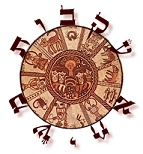
03.22.18 (Nisan 6, 5778) Our actions invariably reveal what we are believing about the nature of reality. We will live what we believe... Put the other way around, what we believe will determine what we do. Nearly all of our conscious intentions are future-directed. We assume that the future will resemble the past, and therefore we make our plans and set our agendas. And yet to what end? What is the purpose of our lives? Where are your actions taking you?
Questions like these concern your personal philosophy of life. Every person makes choices based on their vision and expectation of a future good. Every person therefore lives by a creed that speaks toward the future.... Sadly, many people live for the immediate moments of life: cheap thrills, fast food, and mindless entertainment. "Let's eat and drink, for tomorrow we die" (1 Cor. 15:23). Others may enjoy fine art, reading, and learning - hoping thereby to improve themselves. Most people live in order to love others, friends and family... But apart from God, none of these otherwise good things will ultimately satisfy our hearts. "Disordered love" comes from setting the heart's affections on the transitory, the ephemeral, and the unabiding; but God has set eternity within our hearts (Eccl 3:11). The Lord has "wired" us to experience discontent when our heart's deepest need goes unmet.
On a larger scale, philosophers have asked whether life itself - all of it - has any meaning or purpose. "Why is there something rather than nothing - and for what reason?" Is the universe essentially a random set of events, or is there some overarching purpose and design to everything? Is history linear or cyclical? Does it have a goal or destination, or is this entirely unknowable to us? Are human beings evolving - and if so, to what? Is there a spiritual dimension to reality, or is everything causally determined by matter and motion? Do we have "free will" or are we entirely conditioned to do what we do? Various answers have proposed to deal with these questions over time, including mythological polytheism (e.g., Zoroastrianism, Egyptian/Greek mythology, animism, paganism), cyclical impersonalism (e.g., Hinduism, Jainism, Taoism, reincarnationism, Stoicism), various types of materialism (e.g., scientific naturalism, pragmatism, evolutionism, nihilism), humanism (Buddhism, secular humanism, atheistic existentialism), romantic idealism (Marxism, Hegelianism), mysticism (theosophy, new age thinking, popular Kabbalah), and so on.
The traditional Jewish view of history may be called (for lack of a better term) "monotheistic personalism." There is one Supreme God who is the personal Creator and Ruler of all that exists. God is both immanent (sustaining creation) and transcendant (above creation). This God has a distinct Name (YHVH), a mind, and a moral, purposive will that imbues all of creation. God is LORD over all time and space, the King of Glory, who is Master of all possible worlds. Since God knows and providentially controls everything, human history is a controlled process that leads to a destination. History is therefore progressive and eschatological - leading to a future goal.
But where is everything "going?" In particular, what is the destiny of the human race? If there is a characteristically "Jewish philosophy of history," it decidedly centers on the vision of Zion as the restoration and fulfillment of the lost paradise of Eden. The relationship between Adam and God will be fully restored in the coming theocratic utopia called "heavenly Jerusalem." This is heaven, the place of our deepest longing...
For more on this see: "As the Day Draws Near: Messiah and Philosophy of History."
 |
Be Strong and Courageous...
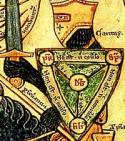 |
03.22.18 (Nisan 6, 5778) A midrash states that at the time of the great Exodus, only a remnant were actually saved while all the others died in the makkah (plague) of darkness, having fallen so low that they could not believe in the redemption or even want to be redeemed! God forbid that we should give up hope now, chaverim, especially because of the great salvation Yeshua secured for us at the cross and in light of the time of his promised coming... B'Chol dor vador: in each and every generation an individual should look upon him or herself as if he or she (personally) had been rescued from Egypt....
And yet divine history is somewhat "cyclical" in its expression. The closer we go back to the beginning, the more we see how the future was "seeded" and gets replayed in every generation. Both the Tree of Life (עֵץ הַחַיִּים) and the Tree of the Knowledge of Good and Evil (עֵץ הַדַּעַת טוֹב וָרָע) were present in the original paradise (Gen. 2:9). When Eve listened to the lies of the nachash (serpent) and regarded the forbidden tree as "desirable to make one wise," she immediately began her descent into exile. At the very dawn of human history, then, we see that "truth" (אֱמֶת) apart from God (א) leads to death (מֵת). Adam and Eve's disobedience led to God's gracious promise regarding the coming "Seed" who would restore all things by being victorious in the war for truth (Gen. 3:15). Of course, this promised Seed was Yeshua, our Suffering Servant and "Second Adam," who, through His sacrifice upon the cross, "reversed the curse" and reconciled humanity with God. Note, however, that this "proto-gospel" message also implied perpetual warfare between the heirs of the Messiah (called the "children of light") and the heirs of Satan (called the "children of darkness"). The ongoing enmity between these "two seeds," then, was ultimately something God willed. The children of light are called to be am kadosh - a holy people - separate from the evil engendered by the fallen world and its forces, just as the very first creative expression of God was the separation of light from darkness (Gen. 1:3-4). The children of light "hate evil and love the good," and conversely, the children of darkness "hate the good and love evil" (Psalm 34:21, Prov. 8:13, Amos 5:15). The Exodus story, then, is not so much a matter of ancient history as it is a present revelation of God's righteous liberating power over the powers of darkness. The great Exodus led to Sinai, and with it the reencountering of the Tree of the Knowledge of good and evil, just as the Cross of Yeshua is the Tree of Life in the midst of the Garden of God. Life is about spiritual warfare, and the power encounter between God and Pharaoh is a paradigm for the ages.
Throughout history we see the repeated attempt to resuscitate or revive ancient "Ra worship" (which derives from Satan in the garden). Every culture has its emissaries of evil -- its "pharaohs," its political dynasties, its caste systems, and its presumed sense of status quo. In the ancient world, most political figures were literally deified; in the Middle Ages, they were thought to rule through "divine right"; but in today's secular world, there is no justification given for their control other than through deception and the naked "will to power." In nearly every case, however, it can be stated that politicians and leaders of this world represent what is most sick about the human condition. Politicians and princlings are given "their hour" in this earth, and they are undoubtedly groomed by the "god of this world" who was a murderer and a liar "from the beginning" (John 8:44). The dust and ashes of countless past civilizations and regimes attest to this truth...
Today we are living in a world that is "globalist" by design. Politicians are often unwitting (and sometimes even witting) lackeys for the darker powers seeking to consolidate power to enslave the whole earth. The so-called global economy and its system of usury is the mechanism that will give rise of yet another "Pharaoh" who likewise will be judged by the LORD God Almighty at the End of Days.
Many people live in a state of fear because they believe the lies and propaganda of "the lords of the darkness of this world" / τοὺς κοσμοκράτορας τοῦ σκότους τούτου (Eph. 6:12). Satan's power always has been through the use of deception. If he can get you to believe a lie, he will begin to control you through fear. This is how the devil has always gained the kingdoms of this world -- through deception and violence... As followers of Yeshua, we must always keep in mind that reality centers on the LORD God of Israel and never in the "rhetorical violence" and metaphysical fantasies of political or media figures.
The LORD God of Israel truly cares about people's liberation from deception and oppression. The story of the Exodus is His everlasting rebuke to all the world's dictators and should cause every politician to soberly assess their fate... The time is coming when His judgment will fall upon all the "kings of the earth who take counsel against the LORD and against His Mashiach" (Psalm 2:2). Ein od milvado: God has all true power, friends. "The LORD is a warrior; the LORD is His Name" / יהוה אִישׁ מִלְחָמָה יהוה שְׁמו (Exod. 15:3).
Presently we are living with the tension of the "already-not-yet" aspect of the original prophecy that "he (the Messiah) will crush his head." Satan still appears to have the upper hand, at least in the temporal realm. Final victory is not yet here, even if it is assured through the promises of God (Rom. 16:20). And while the time appointed by God for the Messianic redemption of Israel and the "End of Days" is a heavenly kept secret (Mark 13:32), there are certain signs called chevlei mashiach (חֶבְלֵי מָשִׁיחַ) - the "birth pangs" of the Messiah - that indicate that the time is indeed imminent when the kingdoms of this earth will openly submit to the reign of Yeshua.
Most of these birth pangs indicate peril and danger, including "distress of nations in perplexity because of the roaring of the sea and the waves," and "men's hearts failing them for fear, and with foreboding of what is coming on the earth" (Luke 21:25-6). In addition, the moral depravity of mankind will be unmasked, showing us clearly that "men shall be lovers of their own selves, covetous, boasters, proud, blasphemers, disobedient to parents, unthankful, unholy, without natural affection, trucebreakers, false accusers, incontinent, fierce, despisers of those that are good, traitors, heady, highminded, lovers of pleasures more than lovers of God; having a form of godliness, but denying the power thereof" (2 Tim. 3:2-3). The increase in "globalism" and the unholy urge to unify the world into a new type of "Babylon" will give the Messiah of Evil (משיח השקר) his coming political platform in the days ahead. "Political correctness," that is, social coercion based on godless consensus, is the ethos of our time...
As followers of Yeshua, we must cling to the truth that "all things work together for good to them that love God" (Rom. 8:28), and we must also take hold of the command given to Joshua: chazak v'ematz, "Be strong and of good courage!" Just as Joshua was promised that the LORD would be with him as he went in to possess the land, so we must remember that the LORD has promised never to leave us nor forsake us (Heb. 13:5; Matt. 28:20), even in the midst of tribulation, or distress, or persecution, or famine, or nakedness, or danger, or sword (Rom. 8:35):
חֲזַק וֶאֱמָץ אַל־תַּעֲרץ וְאַל־תֵּחָת
כִּי עִמְּךָ יְהוָה אֱלהֶיךָ בְּכל אֲשֶׁר תֵּלֵךְ
cha·zak ve'e·matz al ta'a·rotz ve'al te·chat,
ki im·me·kha Adonai E·lo·he·kha be·khol a·sher te·lekh
Be strong and courageous. Do not be terrified, and do not be shattered,
for the LORD your God is with you wherever you go. (Josh. 1:9)

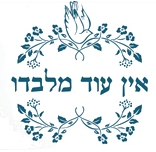
Download Reading Card
We do not need to live in fear, because melo khol ha'aretz kevodo: מְלא כָל־הָאָרֶץ כְּבוֹדו, "the whole earth is filled with His glory (Isa. 6:3). "In God have I put my trust: I will not be afraid what man can do unto me" (Psalm 56:1). Passover is all about the victory of God over the powers of darkness for the sake of our deliverance (i.e., yeshuah: יְשׁוּעָה). The echo of Moses' cry, "Let my people go!" is still resounding in the heavenly realms. So be encouraged, chaverim, even in the face of evil. Do not be terrified and do not be shattered, "for the LORD your God is with you wherever you go."
God's word is our bread, our drink; it's our life, our hope, our fervent expectation, our truth, and our great passion. It's our our dream, our wonder, and our great joy!
Retelling the Story...

[ The following is related to the holiday of Passover, which begins Friday March 30th... ]
03.21.18 (Nisan 5, 5778) We are commanded in the Scriptures to retell "in the hearing of your son and your grandson" how the LORD dealt harshly (הִתְעַלַּלְתִּי) with the Egyptians and performed great wonders to deliver us, so that you may know that I AM the LORD" (Exod. 10:2). This commandment is the basis of the Passover haggadah (i.e., הַגָּדָה, "telling"), the "oral tradition" of our faith, when we personally retell the story from generation to generation so that the spirit of the message is not lost. We participate in the seder to make it "our own story," a part of who we are. Therefore b'khol-dor vador: "Every Jew must consider himself to have been personally redeemed from Egypt." Retelling the story of the exodus enables us to "know that I am the LORD" (Exod. 10:2). We recall the words, bishvili nivra ha'olam – "For my sake was this world created," while we also recall the words, anokhi afar ve'efer – "I am but dust and ashes." When we retell the story of the great redemption, we strengthen our faith and better know the LORD.
The LORD admonishes that the story of our redemption should be "as a sign on your hand and as a memorial (זִכָּרוֹן) between your eyes, that the Torah of the LORD may be in your mouth" (Exod. 13:9). We are instructed to "remember" (זָכַר) over and over again because our disease, our sickness of heart, induces us to forget how we were enslaved in the house of bondage. We must consciously remember and never forget that only by means of God's strong hand (בְּיָד חֲזָקָה) are we ever made free (John 8:36).
 |
The Torah of Passover...
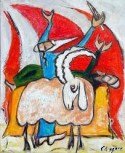
03.21.18 (Nisan 5, 5778) The very first occurrence of the word "Torah" in the Scriptures refers to the faith of Abraham (Gen. 26:5), and the second occurrence refers to the law of Passover: "There shall be one law (תּוֹרָה) for the native and for the stranger who sojourns among you" (Exod. 12:49). There is a link here. Abraham lived before the time of the Exodus, of course, and therefore he obeyed the Torah of Passover by means of the Akedah (the sacrifice of his beloved son Isaac and the substitution of the lamb of God upon the altar). Abraham's faith revealed that the inner meaning of Torah is that the "righteous shall live by faith" (Hab. 2:4, Rom. 1:17), that is, by trusting God's justification of the sinner (Heb. 11:17-19). The Torah of Passover likewise teaches that redemption from death is possible through the exchange of an innocent sacrificial victim. The blood of the lamb was "a sign" of imputed righteousness obtained entirely by faith - with no "leaven," or human works, added. This is the "korban" principle of "life-for-life" that underlies the sacrificial system of the Tabernacle as well. Ultimately all true Torah points to Yeshua, the Lamb of God, who is the divinely appointed Redeemer and promised Slayer of the Serpent...
"When the fullness of time (τὸ πλήρωμα τοῦ χρόνου) had come, God sent forth his Son, born of woman, born under the Torah, to redeem those who were under the Torah, so that we might receive adoption as sons" (Gal. 4:4-5).
 |
The Great Lamb of God...
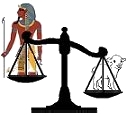
[ The following is related to Shabbat HaGadol, the Sabbath before Passover... ]
03.21.18 (Nisan 5, 5778) Though the LORD instructed each household to select its own lamb for the Passover sacrifice, the Torah refers to "the" Lamb of God, as if there was only one: "You shall keep it [i.e., the Passover lamb] until the fourteenth day of this month, when the whole assembly of the congregation of Israel shall slaughter him (אתוֹ) at twilight (Exod. 12:6). The grammar here is telling. Note that the direct object "him" (i.e., oto) can be read as Aleph-Tav (את) combined with the letter Vav (ו), signifying the Son of Man who is First and Last... Indeed there is only one "Lamb of God" that takes away the sins of the world, and that is our Savior, Yeshua the Messiah...
רָאוּי הַשֶּׂה הַטָּבוּחַ לְקַבֵּל גְבוּרָה
עשֶׁר וְחָכְמָה וְכּחַ וִיקַר וְכָבוֹד וּבְרָכָה
ra·uy · ha·seh · ha·ta·vu·ach · le·ka·bel · ge·vu·rah
o·sher · ve·chokh·mah · ve·ko·ach · vi·kar · ve·kha·vod · uv·ra·kha

"Worthy is the Lamb who was slain, to receive power and wealth and wisdom
and might and honor and glory and blessing"
(Rev. 5:12)

Hebrew Study Card
A Blessed Brokenness...
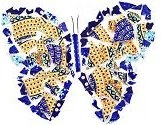
03.20.18 (Nisan 4, 5778) Many of us have been given the special blessing of needing God so viscerally that we would fall apart or even self-destruct apart from His daily intervention in our lives... Yeshua assures the desperately needy of heart: "Blessed are the poor in spirit, for theirs is the kingdom of heaven" (Matt. 5:3). We groan in hope... In our Torah for this week (i.e, Tzav) we read that the fire on the altar was to be kept burning at all times (Lev. 6:12-13), which symbolizes esh tamid (אֵשׁ תָּמִיד), or the perpetual fire of the heart... How blessed it is to be full of the fire of this inner need, this relentless groaning, this constant hunger to be set free. As it is written, the high and lifted up One dwells with the broken and lowly of spirit, to revive the spirit of the lowly and to revive the heart of the crushed:
כִּי כה אָמַר רָם וְנִשָּׂא שׁכֵן עַד וְקָדוֹשׁ שְׁמוֹ
מָרוֹם וְקָדוֹשׁ אֶשְׁכּוֹן וְאֶת־דַּכָּא וּשְׁפַל־רוּחַ
לְהַחֲיוֹת רוּחַ שְׁפָלִים וּלְהַחֲיוֹת לֵב נִדְכָּאִים
ki · kho · a·mar · ram · ve·nis·sa · sho·khen · ad · ve·ka·dosh · she·mo,
ma·rom · ve·ka·dosh · esh·kon · ve·et · dak·ka · ush·fal · ru·ach
le·ha·cha·yot · ru·ach · she·fa·lim · u·le·ha·cha·lot · lev · nid·ka·im

"For this is what the high and lifted up One says, the One who abides forever,
whose Name is Holy: "I dwell in a high and holy place, but also with the broken
and lowly of spirit, to revive the spirit of the lowly and to revive the heart of the crushed."
(Isa. 57:15)

Download Study Card
God reveals Himself to the "lowly in spirit" (שְׁפַל־רוּחַ), that is, to those who understand their own nothingness and complete dependence on Him.... Notice that the word dakka (דַּכָּא) refers to being crushed to the very dust, the very same word used to describe how Yeshua was crushed for our iniquities (Isa. 53:10). William James called this deep work of the spiritual life Zerrissenheit, a term that can be translated as "torn-to-pieces-hood," or a state of being utterly broken and in disarray (see William James: Varieties of Religious Experience). From the point of view of our dependence on God for salvation, dakka refers to humility and contrition we express in light of God's unmerited favor and love for our souls... We identify with the death of Messiah offered on our behalf; we find healing and acceptance in the Presence of the One who was torn to pieces and made dust for our merit. Humility is essential to awareness of God in the truth. "Oh that you would bless me and enlarge my border, and that your hand might be with me (והָיְתָה יָדְךָ עִמִּי), and that you would keep me from evil so that it might not grieve me" (1 Chron. 4:10).
 |
Come out of your tomb....
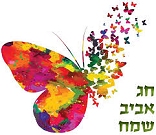
03.20.18 (Nisan 4, 5778) Yeshua said, "I tell you the solemn truth, unless a person is born anew - from above (ἄνωθεν) - he cannot see the kingdom of God." Nicodemus objected and asked, "How can a man be born when he is old? Can he enter a second time into his mother's womb and be born?" (John 3:3-4). Nicodemus had trouble visualizing spiritual reality and therefore reverted to categories of the natural. However, the "ordinary" way of seeing is deeply affected by habit, and therefore it resists the invitation to see the extraordinary, to open the heart and mind, and to let go of the "great possessions" of prejudice. Sadly, many people prefer the comfort of not thinking, not seeing, and not believing over the "discomfort" of being jarred awake to face reality. The message of Passover calls out to those who are willing to hear: "Come to life; be born in the Spirit, awaken, O soul, and come out from your tomb..." (John 11:43-44).
Searching for Chametz...
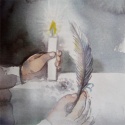
03.19.18 (Nisan 3, 5778) During the Passover Season we remove all traces of chametz (i.e., "leaven") from our lives in obedience to the Torah's commandment: "Seven days you shall eat unleavened bread (i.e., matzah). On the first day you shall remove leaven out of your houses, for if anyone eats what is leavened, from the first day until the seventh day, that person shall be cut off from Israel... In the first month, from the fourteenth day of the month at evening, you shall eat unleavened bread until the twenty-first day of the month at evening" (Exod. 12:15,18). Spiritually understood, we remove chametz to symbolize that we are making a radical break from the past by becoming a new "substance," as the Apostle Paul instructed: "Cleanse out the old leaven that you may be a new lump, as you really are unleavened: for Messiah our Passover Lamb has been sacrificed for us. Let us therefore celebrate the festival, not with the old leaven, the leaven of malice and evil, but with the unleavened bread of sincerity and truth" (1 Cor. 5:7-8). Note that the Greek text uses an imperative verb here (ἐκκαθάρατε): "You cleanse out (i.e., purge, as in catharsis) the old leaven so that you may become a new lump (ἵνα ἦτε νέον φύραμα)" since you have indeed been made new because of what Messiah has done for you." This is a matter of faith, friends, as you "become who you are" by means of trusting in the Salvation of the God of Israel.
"A little leaven leavens the whole lump..." Chametz (i.e., leaven) is considered a corrupting influence, a hidden uncleanness that manipulates purer elements. Like the influence of a lump of leaven in a batch of dough, "spiritual" leaven functions as an evil impulse within us (i.e., yetzer ha'ra: יֵצֶר הַרָע) that corrupts and "sours" our soul. You cannot include a little sin in your life without it affecting your whole spiritual life. This "yeast in the soul" is essentially pride that manifests itself in idolatrous desires and lusts (the "puffed up" rise of the flesh in opposition to God). A practical way to observe the commandment to purge out the old leaven is not only to physically remove leaven from your home, but to look within you heart to see what corrupts and enslaves you in the physical, emotional, and intellectual realms of your life. Are you addicted to pleasure? power? approval from others? Are you enslaved to pride or fear? What holds your attention? What moves your behavior? This is part of the "search for chametz" in your life. Take a few moments to write down all the things that have enslaved you and then tear the list into small pieces. Before Passover arrives, take the torn pieces and burn them in a fire, symbolizing the end of your former life and the making of all things new. "Therefore if any person is in Messiah, he is a new creation: old things are passed away; behold, all things become new" (2 Cor. 5:17).
Related Topics:
Audio Discussions:
For more on this topic see: "Bedikat Chametz: Cleaning out the old leaven."
Seeing yourself in Passover...

[ "In every generation, each person is obligated to see himself [lirot et atzmo: לראות את עצמו] as though he or she personally came forth from Egypt." - Traditional Hagadah ]
03.19.18 (Nisan 3, 5778) Concerning the observance of the Passover Seder the Torah states, "When your son asks you in time to come, 'What is the meaning of the testimonies and the statutes and the rules that the LORD our God has commanded you?' then you shall say to your son, 'We were slaves (עֲבָדִים הָיִינוּ) to Pharaoh in Egypt, but the LORD brought us out of Egypt with a mighty hand. And the LORD showed signs and wonders, great and grievous, against Egypt and against Pharaoh and all his household, before our eyes" (Deut. 6:20-23). We are instructed to "remember what the LORD your God did to Pharaoh and to all Egypt, the great trials that your eyes saw, the signs, the wonders, the mighty hand, and the outstretched arm, by which the LORD your God brought you out" (Deut. 7:19). And where it is written in the Shema, "You shall teach them diligently to your children," we ask, what do we teach? And we answer: Everything – the whole story of our deliverance...
However Passover is more than merely recounting the story of our history. "In every generation, each person is obligated to view himself as though he or she came forth from Egypt" (traditional Haggadah). But how do we envision ourselves as personally experiencing the journey from slavery to freedom? In this connection the traditional sages say that we must viscerally remember our own slavery before were redeemed from satanic tyranny; we must personally experience the power of redemption; we must imaginatively and spiritually experience, at the Seder table, the miracle and the gift of God's freedom...
Our participation goes beyond the idea of empathy for others, since we are to see ourselves as those who are redeemed by the power of God's salvation (yeshuah). The psychological parallel here is that of trauma -- evoking memories of our painful slavery to sin, yet within the greater context of God's redemptive love for us, accepting the offering of the blood of the lamb for our deliverance from death, etc. We eat the maror and matzah of slavery, but we recline, dip twice, and drink wine -- signs of free people and of royalty. Because we are not just spectators but participants, we experience the Exodus for ourselves we personally renew our connection with God and reaffirm our identity as his beloved children...
 |
The Sign of Life...
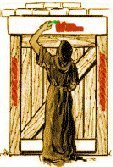
[ The following is related to the holiday of Passover, which begins Friday March 30th... ]
03.19.18 (Nisan 3, 5778) Regarding the Exodus from Egypt (יציאת מצרים) and the Passover Redemption it is written in the Torah:"The blood shall be a sign for you... And when I see the blood, I will pass over you, and no plague will befall you to destroy you, when I strike the land of Egypt" (Exod. 12:13). The blood would be a sign for the eye of faith, i.e., "for you," and not for the unbelieving world at large. During the afternoon of the 14th, the korban Pesach (Passover lamb) was slaughtered and its blood smeared on all three sides of the doorframe, top, right and left, that is, in the form of the letter Chet (ח). This letter is connected with the word chai (חי), "alive," and chayim (חיים), "life," signifying that atoning life is in the sacrificial blood (Lev. 17:11). Note that some say that the letters of the YHVH (יהוה) – the Name of Divine Compassion - were daubed on the doorposts: The Yod (י) was written on the top beam, the Vav (ו) on the right doorpost, and the Hey (ה) on the left. In other words, since Yeshua is YHVH, His Name was written on the doorposts of the faithful.
 |
Truth and Freedom...
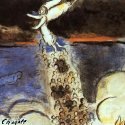
03.19.18 (Nisan 3, 5778) When Yeshua said that the truth would "make us free" (ἐλευθερώσει), he was referring to the acceptance of the Witness of Divine Reality (i.e., the Word, Breath, Spirit, Voice, Message, Meaning, and Love of God) that delivers us from the lies we habitually tell ourselves. If you "persevere in my word" (μείνητε ἐν τῷ λόγῳ τῷ ἐμῷ) he said, "then you are my disciples indeed, and you will know the truth, and the truth will set you free" (ἡ ἀλήθεια ἐλευθερώσει ὑμᾶς, John 8:31-32). In other words, as we identify with his vision and redemptive mission, we will "be free indeed" from the tohu va'vohu (Gen. 1:2) – the "chaos and unreality" – that inescapably besets the way of the lie... We will be delivered from vanity and delusions of this world and its diseased affections; we will be set free from the need to justify ourselves by religion (perfectionism); we will no longer crave other people's approval; we will not be moved by the crowd and its pressures; we will find courage to face our challenges without resorting to escapism; and we will learn how to experience peace even when we encounter frustrations. Despite our daily struggles and tests, we will be released from bondage to anger and resentment as we yield our will in trust that God is working all things together for our ultimate good (Rom. 8:28). Genuine freedom is not an "accidental property" of the heart, depending on "luck" or "fortune," but instead is a decision to believe in the Reality of the salvation of God given in Yeshua our LORD.
 |
Word Became Flesh...

[ The following is related to our Torah reading this week, parashat Tzav.... ]
03.19.18 (Nisan 3, 5778) Our Torah portion this week (i.e., Tzav) begins, "The Eternal (יהוה) spoke to Moses" (Lev. 6:8), which paradoxically refers to God as if He is a man... Theologians may call this sort of language "anthropomorphism," though it clearly anticipates the great Incarnation itself, when the Timeless and Infinite One became embodied in time and space in the person of Yeshua. Indeed Yeshua is called the "Word of God" who became flesh and "tabernacled" in our midst (John 1:1,14). And just as the Angel of the LORD (מַלְאַךְ יְהוָה) mediates the Divine Presence to heavenly host, so Yeshua mediates the Divine Presence to humanity as the "Son of Man" (בֶּן־הָאָדָם). "For the Eternal One who said, 'Let light shine out of darkness,' has shone in our hearts to give the light of the knowledge of His glory in the face of Yeshua the Messiah" (2 Cor. 4:6). In the Book of Hebrews we read that "in these last days God has spoken to us ἡμῖν ἐν υἱῷ," which literally means God speaks in the language "of Son" (Heb. 1:2). The Eternal speaks as the One who emptied Himself to become one of us, who clothed himself in our humanity, so that he could touch us, empathize with us, and to ultimately die for our atonement as the "Lamb of God."
 |
Parashat Tzav - פרשת צו
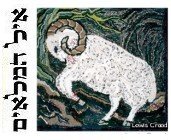
[ Shanah Tovah, friends. Every year we read Parashat Tzav before the holiday of Passover... ]
03.18.18 (Nisan 2, 5778) In our Torah reading for this week (i.e., parashat Tzav) we learn how the first priests of Israel were consecrated for service by the blood of the lamb. First Aaron and his sons were washed with water, arrayed in priestly garments, and anointed with holy oil. During this ordination ceremony, a sin offering and burnt offering were offered on their behalf, and then a special "ram of ordination" (i.e., eil ha-milu'im: אֵיל הַמִּלֻּאִים, lit. "ram of abundance [מָלֵא]") was slaughtered. Some of this ram's blood was applied to the right ear, right thumb, and big toe of the Aaron and his sons (a picture of Yeshua as our suffering High Priest), and the rest of the blood was dashed upon the sides of the altar. After its slaughter, Moses took some unleavened bread and put it in the hands of the priests to perform tenufah (a wave offering) before the altar (a picture of the resurrection).
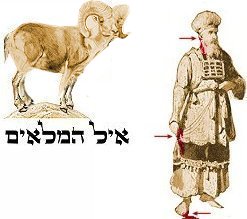 |
As followers of Yeshua, we too have been anointed with the blood from the "Ram of Ordination" -- Yeshua as our Kohen Gadol of the better covenant (Heb. 8:6). And we too have been anointed with the sacred shemen (oil) that symbolizes the presence and aroma of the LORD in our lives. As followers of Yeshua we are therefore truly "...a chosen race, a royal priesthood, a holy nation, a people for his own possession, that you may proclaim the excellencies of him who called you out of darkness into his marvelous light" (1 Peter 2:9). As Yeshua said: "You did not choose me, but I chose you and appointed you that you should go and bear fruit and that your fruit should abide, so that whatever you ask the Father in my name, he may give it to you" (John 15:16). May the LORD God of Israel be pleased to help you serve Him in the truth...
Personal Note: I've had a difficult time lately, with separate medical issues, sickness due to an infection, financial concerns, exhaustion due to web hosting problems, and a lot of sleep deprivation as I worked through several nights restoring data. Presently my voice is nearly gone so the Shavuah Tov Audio Broadcast for this week is abbreviated. Please remember me in your prayers, friends. I cannot do this work without you. Thank you so much.
Shabbat HaGadol and the Lamb...

[ The following is related to the holiday of Passover which begins Friday, March 30th... ]
03.18.18 (Nisan 2, 5778) The Sabbath that occurs immediately before Passover is called Shabbat HaGadol (שבת הגדול), which is historically associated with the selection of the sacrificial lamb four days before the time of Passover (Exod. 12:1-6). The New Testament notes that it was four days before Passover (Nisan 10) when Yeshua made His triumphant entry into Jerusalem riding on a donkey, signifying His Messiahship, in fulfillment of the prophecy of Zechariah: "Rejoice greatly, O daughter of Zion! Shout aloud, O daughter of Jerusalem! Behold, your King is coming to you; righteous and having salvation is he, humble and mounted on a donkey, on a colt, the foal of a donkey" (Zech. 9:9). During this time, when the pilgrims had come to select a lamb for their Passover sacrifice at the Temple - they saw Yeshua and cried out: hoshiah na (הוֹשִׁיעָה נָּא), meaning "please save" or "save now" (in English this phrase was translated from the Latin to form "Hosanna!"). The people spontaneously began singing Psalm 118:25-26 in anticipation of the great Messianic hope:
אָנָּא יְהוָה הוֹשִׁיעָה נּ֑א
אָנָּא יְהוָה הַצְלִיחָה נָּא
בָּרוּךְ הַבָּא בְּשֵׁם יְהוָה
בֵּרַכְנוּכֶם מִבֵּית יְהוָה
an·na · Adonai · ho·shee·ah · na
an·na · Adonai · hatz·lee·chah · na
bar·rookh · ha·ba · be·shem · Adonai
be·rakh·noo·khem · mee·beit · Adonai

"Please, LORD save us! Please, LORD rescue us!
Blessed is He who comes in the Name of the LORD
We bless you from the house of the LORD."
(Psalm 118:25-26)

Hebrew Study Card
Though he came in humility, riding upon a lowly donkey, it is striking to note that once he arrived in Jerusalem for Passover, Yeshua immediately went to the Temple and drove out all who sold there, overturning the tables of the "moneychangers" and the seats of those who sold pigeons (Matt. 21:1-16). The true Lamb of God (שֵׂה הָאֱלהִים) had come! At the Temple he then healed the blind and castigated the religious authorities by stating that the praise of children overruled their objections (Psalm 8:2). Over the next two days, he was accosted by priests, scribes, Pharisees, etc. - the whole religious establishment - which culminated in his utter denunciation of them beginning in Matthew 23 ("Woe unto you..."). He then left the Temple and foretold its destruction to the disciples, going on to explain the signs of the End of the Age (אַחֲרִית הַיָּמִים) that would precede the advent of the Messianic Kingdom (Matt. 24). Yeshua was later crucified (before sundown) on Nisan 14, prophetically corresponding with the time when the Passover lambs were sacrificed at the Temple.
Note: For more on the prophetic aspects of the selection of the Passover lamb, see the Shabbat Hagadol pages. For a tentative chronology of the crucifixion, burial, and resurrection of the Messiah, see "Reshit Katzir: Messiah as the Beginning of the Harvest."
 |
Clear Thinking and Teshuvah...
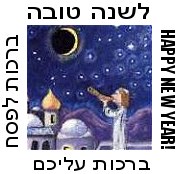
[ Shabbat Shalom and Shanah Tovah, dear friends... ]
03.16.18 (Adar 29, 5778) Tonight marks both the end of the previous year and the beginning of a new one, and therefore it is a special time to reflect on the direction of our lives... The Scriptures say: "As a person thinks in his heart, so is he" (Prov. 23:7). Consider for a moment how your thinking defines your inner reality and the quality of your spiritual life. Thinking is inextricably linked to faith, and therefore we are responsible not only for what we believe, but for how we think (Acts 17:30-31). Sinful thinking creates "negative energy" that brings pain to yourself and others. Left unchallenged, such impaired cognitive function leads to slavery of the mind, hopeless addictions of thought, and distressing captivity. The first step to freedom is to confess our sin, acknowledging the reality of our own negativity – and bringing that truth to the light. Therefore teshuvah – turning to God – involves cheshbon hanefesh (חֶשְׁבּוֹן הַנֶּפֶשׁ), accounting for our soul and yielding it to the love of God for rectification: "If we confess our sins, he is faithful and just to forgive us our sins and to cleanse us from all unrighteousness" (1 John 1:9). For freedom we have been set free, and that means freedom from the power of the lie. If we are blind to our own sin, we cannot confess the truth to find lasting healing (James 5:16).
 |
A New Beginning...

[ The Biblical Year (Rosh Chodashim) begins this evening at sundown (i.e., Nisan 1, 5778), which means that Passover begins in two weeks, on March 30th at sundown. Shanah Tovah! ]
03.16.18 (Adar 29, 5778) The very first word of the Torah indicates the significance of time, namely, bereshit (בְּרֵאשִׁית) - "in the beginning..." (Gen. 1:1), and according to tradition, the very first commandment given to the children of Israel (as a whole) was that of Rosh Chodesh (ראש חודש), or the declaration of the beginning (i.e., rosh) of the "new month," and particularly the very first month of their redemption (see Exod. 12:2). In other words, Passover month (i.e., chodesh yeshuah) was to begin Israel's year, and indeed the sacrificial system itself (i.e., the Tabernacle) was consecrated precisely on the new moon of the first month (Exod. 40:2). Note that the Hebrew word for month (i.e., chodesh) comes from the root chadash (חָדָש), meaning "new," and therefore the Passover redemption was intended to mark a "new beginning" for the Jewish people. And indeed, God marks the start of our personal redemption as the beginning of our life as a new creation (2 Cor. 5:17), just as Yeshua is the "first of the firstfruits" of God's redeemed humanity (1 Cor. 15:45-49).
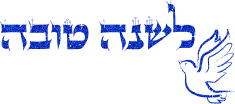 |
Should Christians Keep the Passover?
It is written in our Scriptures: "Let the people of Israel keep the Passover at its appointed time (וְיַעֲשׂוּ בְנֵי־יִשְׂרָאֵל אֶת־הַפָּסַח בְּמוֹעֲדוֹ). On the fourteenth day of this month, at twilight, you shall keep it at its appointed time; according to all its statutes and all its rules you shall keep it" (Num. 9:2-3). "Observe the month of Aviv (i.e., Nisan) and keep the Passover to the LORD your God, for in the month of Aviv the LORD your God brought you out of Egypt by night" (Deut. 16:1; cp. Exod. 12:1-20). Regarding the question of whether followers of Yeshua should celebrate the festival of Passover by participating in a Yeshua-honoring Seder, the answer is a resounding YES! After all, Yeshua is the Author of the Torah and its Voice, Word, and Perfect Expression. He is the true Lamb of God (שֵׂה הָאֱלהִים) that was prefigured in the garden of Eden, exemplified in the sacrifice of Isaac (i.e., the Akedah), symbolized in the blood of the sacrifice of the lamb of God daubed in the form of a cross on the doorposts in Egypt during the great Exodus, and was finally perfectly realized in the sacrificial death and crucifixion of Yeshua during the time of the sacrifice of the korban Pesach (Passover lamb) at the Temple. Indeed the "Lord's Supper" or "Communion" is based on the Passover Seder where Yeshua explained how his sacrificial death as the Lamb of God would take away the sins of the world (see John 1:29; Luke 22:15; etc.). Therefore in the New Testament we read that the Apostle Paul instructed us to perform bedikat chametz and observe this festival: "Cleanse out the old leaven (i.e., chametz: חָמֵץ) that you may be a new lump, as you really are unleavened. For Messiah, our Passover lamb has been sacrificed (מָשִׁיחַ זֶבַח פִּסְחֵנוּ). Let us therefore keep the feast, not with the old leaven, the leaven of malice and evil, but with the unleavened bread of sincerity and truth" (1 Cor 5:7-8).
Reckoning our Days...
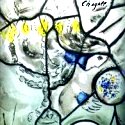
03.16.18 (Adar 29, 5778) Moses prayed to God: "teach us to number our days," that is, help us understand how to make our days count for eternity, to have a weight of glory that will shine in the world to come... The sages say on the day of death, one considers one's life as if it had been but a single day... Life goes by so quickly, and we never know when our personal Rosh Hashanah will come. "No one knows the day or hour..." Test yourself by looking at the clock: As each hour passes, ask whether you have accomplished any good for your soul. Where are you going, today? That's why it is so vital to be healed and to turn to God while there is still time. So turn to him today and bacharta ba'chayim (בָּחַרְתָּ בַּחַיִּים) – "choose life!" "For this commandment (of turning to God in teshuvah) is not hidden from you, and it is not far away. It is not in heaven... nor across the sea.... Rather, the matter is very near you - in your mouth and heart - so you can do it" (Deut. 30:11-14; cp. Rom. 10:8-13).
לִמְנוֹת יָמֵינוּ כֵּן הוֹדַע
וְנָבִא לְבַב חָכְמָה
lim·not · ya·me·nu · ken · ho·da
ve·na·vi · le·vav · chokh·mah

"Teach us to number our days
that we may apply our hearts unto wisdom."
(Psalm 90:12)

Hebrew Study Card
Despite the frailty and brevity of our days, may it please God to shine the power of His radiance upon us and to establish our works for His praise. May He help us to "number our days" so that we may obtain levav chokhmah (לְבַב חָכְמָה) - a heart of wisdom to live according to His will (James 1:5). Above all else, may the "God of our Lord Yeshua the Messiah, the Father of Glory (אֲבִי הַכָּבוֹד), impart to you a spirit of wisdom and of revelation in the knowledge of Him, having the "eyes of your hearts" (ὀφθαλμοὺς τῆς καρδίας) enlightened, that you may know what is the hope to which he has called you" (Eph. 1:17-18). May you be strong, resolute, and fully focused on our LORD, chaverim. Amen.
Shabbat HaChodesh...
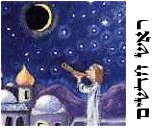
[ The last Sabbath of the year is a "wake up call" to begin preparing for Passover... ]
03.16.18 (Adar 29, 5778) This coming Sabbath is called "HaChodesh" (the "Sabbath of the Month" [of Nisan]), which means it is the very last Sabbath of the Biblical year. We honor this event by "sanctifying" the new moon (Exod. 12:1-20), and we spiritually prepare for this season by taking some time to review the meaning and importance of the season of Passover. For instance, Passover has four traditional names: Chag Ha-Pesach (the holiday of the Passover [Num. 9:2]); Chag HaMatzot (the holiday of Unleavened Bread [Exod. 12:17-20]); Chag Ha-Aviv (the holiday of Spring [Deut. 16:1]), and Z'man Cheiruteinu (the Season of our Freedom). The Torah also uses four expressions of freedom to tell the Jewish people how He will take them out of Egypt ("I will bring you out"; "I will free you"; "I will redeem you"; and "I will take you as my own"), each expression of which is associated with one of the four cups of the traditional Seder. Above all, however, Passover marks the yahrzeit (anniversary of the death) of Yeshua as our Passover Lamb.
 |
The Very First Passover...

03.16.18 (Adar 29, 5778) The story of Passover goes all the way back to the beginning, to the very orchard of Eden itself, when Adam and Eve disobeyed God and ate from the forbidden tree. Because of their transgression, our original ancestors incurred the plague of death and were exiled from the Divine Presence, though God graciously promised to heal them through the coming Seed of the woman – the Savior who would crush the head of the serpent and break the fangs of his venomous sting (Gen. 3:15). Soon after making this great promise, God clothed our original parents with the skin of a sacrificed lamb (Gen. 3:21), linking their coming deliverance with the "Lamb of God slain from the foundation of the world" (1 Pet. 1:18-20). The very first "Passover" was in the garden. And the story of Passover extends to the world to come, where in the redeemed paradise of God we will celebrate the victory of the Lamb who was slain for our redemption (Rev. 5:12-13).
The great story of our redemption is revealed on two levels in Scripture - one that concerns the paradise of Eden (the universal level), and the other that concerns the paradise of Israel (the particular level). Therefore Yeshua is both rightly called the "Lamb of God who takes away the sins of the world" (John 1:29) and "the Messiah our Passover Lamb who has been sacrificed for us" (1 Cor. 5:7). Likewise he is both called the "Seed of the woman," and "the Son of David"; the "Second Adam," and the "King of the Jews," and so on. The story of Israel's redemption in Egypt therefore serves as an allegory of both the universal salvation promised in Eden (i.e., the lamb slain from the foundation of the world) as well as the revelation of the sacrificial ministry of Yeshua as Israel's promised Messiah. Yeshua is both the Savior of the world as well as Israel's true King and Deliverer.
Note: For more on this subject, please see the articles, "The Very First Passover" and "The Gospel in the Garden."
 |
Getting Ready for Passover...
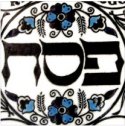
03.15.18 (Adar 28, 5778) Preparing for Passover usually begins a full month before the holiday arrives, just after the festival of Purim (or at the latest around the time of the New Year of spring, i.e., Nisan 1). Since no leavened bread may be eaten during all seven days of Passover, we make a special effort to remove leaven entirely from our homes, in obedience to the Torah's command (see Exod. 12:15). This means we clean every room of the house so that all "chametz," or leavened products, are removed. We search for bread crumbs under the cushions of our sofas and chairs, in the pockets of our coats and pants, on closet floors, and remove every trace. We also thoroughly clean our stove, oven, refrigerator, and freezer. It is a big job to clean the house so thoroughly, but doing so provides an important "object lesson" about the need to separate ourselves from corrupting influences in our lives. The traditional spring cleaning also helps us spiritually prepare for the coming new year, and at this time we take some time to review the Passover Haggadah and make plans for the Seder as well... (For more see this page.)
 |
The Meaning of Holiness...

03.15.18 (Adar 28, 5778) "For I am the LORD who brought you up out of the land of Egypt to be your God. You shall therefore be holy, for I am holy" (Lev. 11:45). Because we are God's people, his redeemed children, we should be holy, just as God is holy (1 Pet. 1:15-16). Holiness, however, is not a matter of what you do (such as wrapping yourself in religious rituals) but instead is a matter of what you "allow" to happen: You let go and allow yourself to be rescued and taken up from the "depths of Egypt" to be with God. Holiness is something you receive by faith; it is a gift of being "set apart" to be sacred and beloved by God. Genuine holiness (i.e., kedushah) is connected with love and grace...
In Hebrew, the word kedushah (קְדוּשָׁה) means sanctity or "set-apartness" (other Hebrew words that use this root include kadosh (holy), Kiddush (sanctifying the wine), Kaddish (sanctifying the Name), kiddushin (the ring ceremony at a marriage), and so on). Kadosh connotes the sphere of the sacred that is radically separate from all that is sinful and profane. As such, it is lofty and elevated (Isa. 57:15), beyond all comparison and utterly unique (Isa. 40:25), entirely righteous (Isa. 5:16), glorious and awesome (Psalm 99:3), full of light and power (Isa. 10:7), and is chosen and favored as God's own (Ezek. 22:26).
After the LORD split the sea and led his people across, Israel sang a song of praise to Him. Shirat Hayam (the Song of the Sea) is an "antiphon", or song of response to the loving deliverance given by the LORD (Exod. 15:1-21). "The LORD is my strength and my song, and he has become my salvation; this is my God, and I will praise him, my father's God, and I will exalt him..." "Who is like you, O LORD, among the gods? Who is like you, majestic in holiness, awesome in glorious deeds, doing wonders? You have led in your steadfast love the people whom you have redeemed; you have guided them by your strength to your holy abode... You will bring them in and plant them on your own mountain, the place, O LORD, which you have made for your abode, the sanctuary, O Lord, which your hands have established."
Note further that the opening statement, "Then they sang" is actually in the future tense: "Then they will sing," which refers to the coming of Messiah. Indeed, in Revelation 15:3 we read that the song will indeed be sung to the Heavenly Bridegroom in the coming New Jerusalem... Note also that in the closing phrase of the song, "the LORD will reign forever" (Exod. 15:18), the word "will reign" (יִמְלךְ) is spelled with a missing Vav, which suggests the Messiah Yeshua. The LORD will indeed reign when the rightful heir to the throne of David and the true King of Israel soon appears. Then shall we be with our Beloved forever and ever.
 |
Torah of Faith...
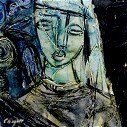
03.14.18 (Adar 27, 5778) "The righteous shall live by faith" in the promise of God's unconditional love (Hab. 2:4; Rom. 1:17). The Torah of faith (תּוֹרַת הָאֱמוּנָה) therefore includes these additional commandments from the heart of Yeshua: 1) "Thou shalt believe thou are my beloved - entirely accepted and entirely forgiven"; 2) "Thou shalt forget the shame of thy past"; 3) "Thou shalt stop thinking of your sin but rather of My great remedy for you"; 4) "Thou shalt let me carry your woundedness far away, yea, to the bottom of the sea"; 5) "Thou shalt live in My love and be filled with its spirit," and 6) "Thou shalt be made new." Amen. We are to know ourselves as "dead to sin but alive to God" (Rom. 6:11), which means we die to despair, we die to fear of abandonment, yea, we die to death itself, and now we are alive to hope, alive to healing, yea, we alive to love that endures forever.
הִנֵּה עֻפְּלָה לא־יָשְׁרָה נַפְשׁוֹ בּוֹ
וְצַדִּיק בֶּאֱמוּנָתוֹ יִחְיֶה
hin·nei u·pe·lah lo ya·she·rah naf·sho bo
ve·tzad·dik be·e·mu·na·to yich·yeh

"Behold, his soul is puffed up; it is not upright within him,
but the righteous shall find life by means of his trust."
(Hab. 2:4)
Hebrew Study Card
Happy New Year, friends!
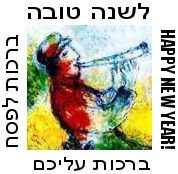
[ The advent of the month of Nisan foretells that Passover will be here in just two short weeks, with the Seder to be observed on Friday March 30th at sundown... ]
03.14.18 (Adar 27, 5778) The beginning of the Biblical Year (called Rosh Chodashim) begins this Friday evening at sundown (i.e., Nisan 1). Look for the first sign of the waxing crescent in the coming week, chaverim. Spring is in the air! Now is the time to make preparations for your Passover seder, which occurs in just two weeks!
According to the sages, there are two orders of creation, the natural and the supernatural, both of which mirror each other in the biblical calendar. The natural order refers to the physical creation of the heavens and the earth, whereas the supernatural refers to re-creation, or rebirth. On the traditional calendar, the natural order of creation is commemorated in the fall, during Rosh Hashanah (i.e., Tishri 1), whereas the supernatural is celebrated in the spring, during Rosh Chodashim (i.e., Nisan 1).
The following prayer is customarily said during Rosh Hashanah (in the fall), but it is equally applicable for the New Year of Nisan and the great Season of Passover:
יְהִי רָצוֹן מִלְּפָנֶיךָ יהוה אֱלהֵינוּ
וֵאלהֵי אֲבוֹתֵינוּ
שֶׁתְּחַדֵּשׁ עָלֵינוּ שָׁנָה טוֹבָה וּמְתוּקָה
בַּאֲדנֵינוּ יֵשׁוּעַ הַמָּשִׁיחַ אמן
ye·hi · ra·tzon · mil·fa·ne·kha, · Adonai · E·lo·hei·nu
ve·lo·hei · a·vo·tei·nu,
she·te·cha·desh · a·lei·nu · sha·nah · to·vah · u·me·tu·kah
ba·A·do·nei·nu · Ye·shu·a · ha·Ma·shi·ach [a·men]

"May it be your will, LORD our God
and God of our fathers,
that you renew for us a good and sweet year
in our Lord Yeshua the Messiah." [Amen]

Download Study Card
May it please the Lord our God to help us attune our hearts to the theme of this great Passover season, and to prepare ourselves to "keep the feast" (1 Cor. 5:7-8). May He help us all get rid of the spiritual "chametz" (leaven) that sours our soul and to grant us sincerity and the keenness of concentration needed for this time....
The Call of Vayikra...
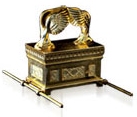
[ The following is related our Torah reading for this week, parashat Vayikra... ]
03.14.18 (Adar 27, 5778) The first verse of the Book of Leviticus is usually translated: "And the LORD called to Moses and spoke to him," where the subject of the verb vayikra (וַיִּקְרָא), "and he called," has an implied antecedent, which if expressed would read: "And the LORD called to Moses and the LORD spoke..." The Hebrew text of the Torah scroll is written with a small Aleph (א) at the end of the verb vayikra, however, indicating something of textual and grammatical interest. Note that the Hebrew letter Aleph is constructed from two Yods (each that represent a yad, or "hand") joined by a diagonal Vav (that represents a man). One Yod (י) reaches upward while the other reaches downward, and both extend from the "fallen" Vav (ו), picturing Yeshua, the humble One who was "wounded for our transgressions, and bruised for our iniquities" as our Mediator between heaven and earth (Isa. 53:5; 1 Tim. 2:5). The implied Subject, then, of vayikra can be seen to be the "small Aleph," the Humble One who calls out from the Tent of Meeting...
"And he called" is written anonymously, but once you understand that this is the Word of the LORD speaking, you will turn back to the Creator and then YHVH will speak to you from within the Tent of Meeting... May you hear His Voice now.
Awakening to Holiness...

[ The following is related our Torah reading for this week, parashat Vayikra... ]
03.13.18 (Adar 26, 5778) The Torah records God's first act of creation with the imperative utterance: "Let there be light" (i.e., yehi or: יְהִי אוֹר) and then goes on to say that "God separated (וַיַּבְדֵּל) the light from the darkness (Gen. 1:3-4). It is this "separation," or distinction, that is foundational to the concept of kedushah (קְדֻשָּׁה), or "holiness." Holiness is also expressed in the distinction between ordinary and sacred time: "God blessed the seventh day and made it holy" (יְקַדֵּשׁ) because on it God rested from all his work that he had done in creation" (Gen. 2:3).
The overall theme of the Book of Leviticus is kedushah, and indeed the Hebrew root (קדשׁ) occurs over 150 times in the book. Since God is kadosh (קדשׁ), we must be kadosh in our lives as well, and this means first of all being conscious of the distinction between the sacred and the profane, the "clean" and the unclean, and so on. "You are to distinguish between the holy and the common, and between the unclean and the clean" (Lev. 10:10). Note that the word translated "distinguish" (וּלֲהַבְדִּיל) comes from the same verb used to describe how God separated the light from the darkness. We are to separate between (בֵּין) the holy and the profane, which means we need understanding (i.e., binah: בִּינָה), or the ability to discern between realms of reality... As it is written, "You shall be holy to me, for I the LORD am holy and I have separated you (וָאַבְדִּל) from other people that you should be mine" (Lev. 20:26).
וִהְיִיתֶם לִי קְדשִׁים כִּי קָדוֹשׁ אֲנִי יְהוָה
וָאַבְדִּל אֶתְכֶם מִן־הָעַמִּים לִהְיוֹת לִי
vi·yi·tem · li · ke·do·shim · ki · ka·dosh · a·ni · Adonai
va·av·dil · et·khem · min-ha·a·mim · li·he·yot · li

"You shall be holy to me, for I the LORD am holy
and I have separated you from the peoples to be mine"
(Lev. 20:26)

There is no other way to approach the Holy One apart from consciousness of His infinite glory and unsurpassable worth. "I will lift up my eyes to the hills" (Psalm 121:1). As the Holy One (i.e., ha-kadosh: הַקָּדוֹשׁ), the LORD (יהוה) is utterly unique, distinct, sacred, and set apart as the only One of its kind. He alone is worthy of true worship and adoration, since He alone is utterly peerless, without rival, and stands in relation to the world as Creator, Redeemer, and Lord. To affirm the LORD is holy is to be conscious that He is utterly sacred.
Holiness involves first of all the awareness or consciousness that there is a realm of reality "higher than" the material world (the light God created and separated from darkness was not physical), and this realm of reality is centered on Person and Will of God. A denial of this leads to the idolatrous view that material (i.e., profane) reality is absolute and therefore ascribed eternal worth. "The fear of the LORD is the beginning of wisdom." However, the LORD does not want us to merely recognize His holiness (in some abstract or intellectual sense) but calls us to be in relationship with Him, and this implies personal sanctity and separation: Again, "you shall be holy to me, for I the LORD am holy and I have separated you (וָאַבְדִּל) from other people that you should be mine" (Lev. 20:26). The purpose of the sacrificial system was to draw near to God, and this "drawing near" required a separation from the profane world and its habitual uncleanness. The call to be holy is therefore the call to wake up and become alive to God's Presence in this world.
Beyond these Shadows...

03.13.18 (Adar 26, 5778) Long before the time of the philosopher Plato, King David proclaimed that there was a "divided line" between the realm of the temporal world and realm of the eternal world. The temporal world is finite, subject to change, and points beyond itself to an eternal world which is the source of real significance and truth. Nevertheless, the temporal world (olam ha'zeh) is not unimportant, since how we live within the intersection of these two realms defines our posture of faith, determining our ultimate destiny... Unlike life-denying religions, we do not detach from this world, though neither do we cling to it as our home, but we are constrained to live in the paradoxical mediation of time within eternity (Rom. 8:20). In a sense, then, life in this world is a test that asks the us the question of whether we will choose to believe in the reality of love, healing, and heaven. Yes there is heartache here; yes we are in exile, at times we are profoundly lonely. We often experience the world as darkness (עוֹלָם הַשֶׁקֶר). Should we despair then, since the "outer self" returns to dust even though our "inner self" is renewed by faith (2 Cor. 4:16)? No, since God loves life and indeed the invitation of the gospel appeals to our desire to find life: darshuni vichyu: "Seek me and live" (Amos 5:4). Our ultimate concern is to "find God or die."
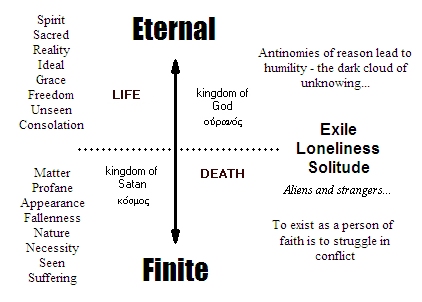 |
Surely the Lord understands our great need for healing and life, and therefore the dualism of the self and the fractured nature of reality imparts within us a sense of imbalance and even trembling as we sojourn through the "valley of the shadow of death" (Phil. 2:12). We nevertheless press on as "strangers and pilgrims" (ger v'toshav), for the illusions of this world are nothing for us, and with a deep sigh of the heart we look for the completion of our redemption, our promised heavenly home. This is often difficult to do as we must both endure the vanity of this world while keeping our minds focused on what is real, true, and abiding. Like Abraham who "did not weaken in faith when he considered his own body, which was as good as dead, but was fully convinced that what God had promised he was also able to do (Rom. 4:19-21), we must take hold of the words of our Savior, who said: "I give you eternal life, and everyone who lives and believes in me shall never die" (John 11:26). Friend take heart, "for our citizenship is in heaven, and from it we await the Savior, the LORD Yeshua the Messiah, who will transform our lowly body to be like his glorious body by the power that enables him to subject all things to himself" (Phil. 3:20-21). Therefore stand firm in the LORD and the power of his might. Amen.
שִׁמְעָה־תְפִלָּתִי יְהוָה וְשַׁוְעָתִי הַאֲזינָה
אֶל־דִּמְעָתִי אַל־תֶּחֱרַשׁ כִּי גֵר אָנכִי עִמָּךְ
תּוֹשָׁב כְּכָל־אֲבוֹתָי
shim·ah · te·fil·la·ti · Adonai · ve·shav·a·ti · ha·a·zi·nah
el · dim·a·ti · al · te·che·rash · ki · ger · a·no·khi · i·makh
to·shav · ke·khol · a·vo·tai

"Hear my prayer, O LORD, and give ear to my cry;
hold not your peace at my tears! For I am a sojourner with you,
a guest, like all my fathers."
(Psalm 39:12)

Hebrew Study Card
The Thirst for Life...
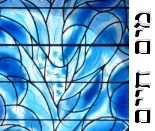
03.12.18 (Adar 25, 5778) Spiritually speaking, there are two basic sorts of breaking. One is to be broken by the inevitable sin and ruin of this world, and the other is to have "lev-nishbar," a broken heart, before the LORD (2 Cor. 7:10). The former comes from the vain attempt to find life in the broken vessels of this world (Jer. 2:13), whereas the latter comes from the realization of an incurable inner emptiness (Matt. 5:4). The soul finds eternal satisfaction desiring God's righteousness, since God alone provides the vessel of "living water" we need to live (John 4:14; 7:38). We all must drink from God's fountain of life, lest we suffer spiritual dehydration and death. All who are thirsty, come to the waters...
Are you haunted by an inner ache for love, joy, peace, and life? "Blessed are those who hunger and thirst for righteousness, for they shall be satisfied" (Matt. 5:6). Such inner poverty is a disguised grace, and the desire for healing reveals the Spirit's invitation. Faith begins with the recognition of what we really want, since only then will we come to Yeshua for the "bread of life" and "living water." All we need is found in him, though we must reach out in faith to receive: "For without faith it is impossible to please him, for whoever would draw near to God must believe that he exists, and that he rewards those who seek him" (Heb. 11:6). God rewards those who seek him out; he answers the heart's cry; he responds to all who hope in his love and salvation. Therefore, as Yeshua said: "Ask, and it will be given to you; seek, and you will find; knock, and it will be opened to you. For everyone who asks receives, and the one who seeks finds, and to the one who knocks it will be opened" (Matt. 7:7-8). We are not saved by faith in our own faith, but in the Reality and Power of the LORD God who does the miracle of raising the dead to newness of life.
Do you have the "gift of holy desperation"? That's the very special blessing of needing God so viscerally that you otherwise will fall apart or even self-destruct apart from His ongoing intervention in your life... You pray because your very life depends on it; you believe because without God, you would be swallowed up in darkness. The fire on the altar was to be kept burning at all times (Lev. 6:12-13) symbolizing the "inner fire of the heart." How blessed it is to be full of the fire of this inner need, this relentless groaning, this constant hunger and thirst for God and his righteousness! How fortunate we are to receive daily bread from the hand of our heavenly Father.
הוֹי כָּל־צָמֵא לְכוּ לַמַּיִם
וַאֲשֶׁר אֵין־לוֹ כָּסֶף לְכוּ שִׁבְרוּ וֶאֱכלוּ
וּלְכוּ שִׁבְרוּ בְּלוֹא־כֶסֶף וּבְלוֹא מְחִיר יַיִן וְחָלָב
hoy · kol · tza·mei · le·khol · la·ma·yim
va·a·sher · ein-lo · ka·sef · le·khu · shiv·ru · ve·e·cho·lu
u·le·khu · shiv· ru · be·lo-khe·sef · u·vlo · me·chir · ya·yin · ve·cha·lav
Ah, d
"Ho, all who are thirsty come for water,
even the one who has no money, come, buy food and eat:
come buy without money wine and milk without cost"
(Isa. 55:1)

Our Blessed Yearning....
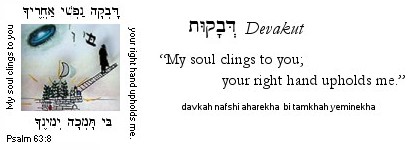
03.12.18 (Adar 25, 5778) There is an "upside-down way" of experiencing heavenly growth and lasting prosperity: "It was good for me that I was afflicted, that I might learn your decrees" (Psalm 119:71). Affliction is a teacher... There is a blessing when you feel like you are "falling to pieces" because then you can know "in your bones" that only God can hold you together... Affliction serves as a "leash" of sorts, keeping us close to God's side, helping us number our days to attain a heart of wisdom (Psalm 90:12). As Yeshua said: Ashrei aniyei ha'ruach: "blessed are the poor in spirit," ki la'hem malchut ha'shamayim: "for theirs is the kingdom of heaven" (Matt. 5:3). Such inner poverty is a disguised grace, and the desire for healing reveals the Spirit's invitation. Kotzer ruach (קוֹצֶר רוּחַ) is a phrase that means being short of breath, panting for the Divine Presence, yearning for God. When you are wounded, desperate, and find nothing else within you for life, then you are able to see clearly and to receive the miracle of the divine comfort. "I know, O LORD, that your judgments are right, and that in faithfulness you have afflicted me. Let your steadfast love comfort me according to your promise to your servant. Let your tender mercies come to me, that I may live; for your Torah is my delight" (Psalm 119:75-77).
טוֹב־לִי כִי־עֻנֵּיתִי לְמַעַן אֶלְמַד חֻקֶּיךָ
tov li khi-u·ne·ti, le·ma·an el·mad chu·ke·kha

"It is good for me that I was afflicted,
that I might learn your decrees."

Learn to see your daily afflictions as a blessing in disguise, an opportunity for you to develop the precious middah (quality) of patience and endurance... Indeed, it is curse to be devoid of need before the LORD, and therefore affliction is a means to receiving divine comfort.
The students of Rabbi Shimon bar Yochai asked him: Why did the manna not fall once a year [as opposed to once a day]? He answered, I will give you a parable: It can be compared to a mortal king who had a son for whom he provided food once a year; as a result, he saw his son but once a year. Thereupon he provided for his maintenance daily, so that he called upon him every day. The same is with Israel. One who had four or five children would worry and say, 'Perhaps no manna will fall tomorrow, and we will all die of hunger.' Thus they turned their faces to heaven in prayer (Yoma 76a).
Just as God humbled Israel with manna in the desert, so He humbles us. "Give us this day our daily bread..." The purpose of affliction is ultimately good and healing: God humbles us with manna so "that he might make you know that man does not live by bread alone, but man lives by every word that comes from the mouth of the LORD" (Deut. 8:3). In other words, God uses the discipline of affliction to lead us to the truth. We often pray that our problems be taken away, but God sometimes ordains these very problems so that we will draw near to Him... Yeshua told us, "Your heavenly Father knows what you need before you ask Him." Many of us are slow to learn, but God is patient with those whom He disciplines. The goal is to never lose sight of what's most important, which is God Himself.
Humility and Torah...

[ The following is related our Torah reading for this week, parashat Vayikra... ]
03.12.18 (Adar 25, 5778) It is an age-old Jewish custom to begin teaching young children the Torah beginning with Vayikra because they, like the sacrifices themselves, are considered pure. The sage known as the Kli Yakar states that this is one of the reasons why the Aleph (א) in Vayikra (ויקרא) is written very small in the Torah scroll. Let these teachings be the beginning, like the letter Aleph, which is the beginning of the Aleph-Bet. When we humble ourselves as little children, God will reveal His truth to us, just as Messiah humbled himself for the sake of touching us in our frailties...
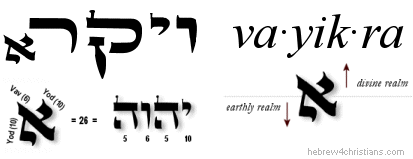 |
Aleph is the first letter of the first word of the first commandment of God: anokhi (אָנכִי): "I AM" (Exod. 20:2), which also designates the Name ehyeh (אֶהְיֶה) first revealed to Moses (Exod. 3:14). The numerical value of Aleph is one, indicating its preeminence, and it is a silent letter, alluding to the ineffable mystery of God's sovereign will (the related word aluph (אַלּוּף) means "Master" or "Champion"). In the Hebrew script used for writing Torah scrolls (ketav Ashurit), Aleph is constructed from two Yods (that represent "hands") joined by a diagonal Vav (that represents man). One Yod (י) reaches upward while the other reaches downward, and both extend from the "fallen" Vav (ו), picturing a "wounded Man" or Mediator (1 Tim. 2:5). In the Hebrew numbering system (i.e., gematria), Yod = 10 and Vav = 6, so adding up the three parts of Aleph yields 26, the same value as the Name of the LORD: YHVH (יהוה). The very first letter of the Hebrew Alphabet, then, pictures the three-in-one LORD who mediates all of life for our salvation. And just as there are three parts to Aleph, but Aleph is One (echad: אֶחָד), so there are three Persons to the Godhead, yet God is absolutely One. Indeed, the gematria of the word Aleph (אָלֶף) is 111 (Aleph=1, Lamed=30, and Pey=80). As Yeshua said, every "jot and tittle" of Scripture is significant...
Shabbat HaChodesh - שַׁבַּת הַחדֶשׁ

[ This coming Sabbath is called "Shabbat HaChodesh" (the "Sabbath of the Month" [of Nisan]), which marks the last Sabbath before the Biblical New Year... Shanah Tovah Chaverim! ]
03.11.18 (Adar 24, 5778) The world runs on a "clock" that operates under assumptions that are different than those revealed in the Scriptures.... The "wisdom of this world" (σοφία τοῦ κόσμου τούτου) is the prevailing cultural spirit that suppresses the reality of God's Presence and truth. Such "wisdom" is regarded as foolishness before God, and God has promised to "seize the so-called wise in their own craftiness" (1 Cor. 3:19). The life of faith, on the other hand, sees what is invisible. Faith (emunah) apprehends "the substance (ὑπόστασις) of things hoped for, the assurance (ἔλεγχος, conviction, "correction," "argument," i.e., tokhachat: תוֹכַחַת) of things not seen" (Heb 11:1). The heart of faith "looks not to the things that are seen but to the things that are unseen. For the things that are seen are transient, but the things that are unseen are eternal" (2 Cor. 4:18).
The Sabbath that immediately precedes (and sometimes falls on) the Biblical New Year is called Shabbat HaChodesh (שַׁבַּת הַחדֶש), the "Sabbath of the Month" (of Nisan). This Sabbath is significant because it marks the start of the month of Redemption (i.e., the first month called Nisan) which God called "the beginning of months" (i.e., Rosh Chodashim). We honor this event by reading an additional passage from the Torah concerning the sanctification of the new moon (Exod. 12:1-20), and we spiritually prepare for this month by studying about Passover and the coming spring holidays:

Two Weeks to Passover!
The commandment to sanctify the first new moon of the year (i.e., Rosh Chodashim) reveals that it is our responsibility to sanctify (i.e., observe) Biblical time in general. In other words, when we observe "the beginning of months," we are acknowledging that time itself is rooted in the Biblical calendar with its divinely inspired cycle of festivals (i.e., the moedim). Note that this year the Biblical New Year begins on Friday, March 16th at sundown, and therefore Passover begins just two week weeks later, on Friday, March 30th at sundown:
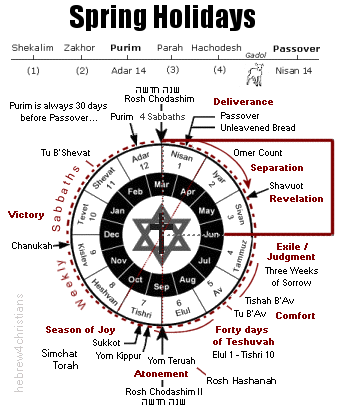 |
Originally Rosh Chodashim was simply called the "first month" because it marked the month of the Exodus and the other months were named in relation to it, similar to the days of the week in the Hebrew calendar (i.e., the first day, the second day...). Later it was called Chodesh Ha-Aviv (חדֶשׁ הָאָבִיב) - "the springtime month" (because the calendar is reset in the spring) and later still as Nisan (נִיסָן), to recall God's faithfulness after the Babylonian Exile (Neh. 2:1; Esther 3:7). So important is this month that the Jewish sage Rabbi Moshe ben Nachman (Ramban) wrote regarding the commandment to observe Rosh Chodashim:
"The verses (Exod. 12:1-2) mean that this month should be counted first, and beginning with it, the count should proceed to the second, the third, and so on, till the end of the sequence with the twelfth month. In this way, this month should be a commemoration of the Great Miracle (i.e., our Redemption), and every time we mention the months, the Miracle will be alluded to. It is for that reason that the months do not have names in the Torah, but rather they are identified by number."
The word Nisan might come from either the word nitzan (נִצָּן), meaning "bud" (Song 2:12), or the word nissim (נִסִּים) meaning "miracles," both of which suggest physical and spiritual resurrection in our lives. Others think the word comes from the verb nus (נוּס), meaning "to flee," both in relation to Israel's flight from Egypt and Egypt's flight from Israel (i.e., when the pursuing Egyptian cavalry fled (נָסִים) before the sea closed upon them (Exod. 14:25, 27). We also see this usage in the verse: "The wicked flee (נָסוּ) when no one pursues, but the righteous are bold as a lion" (Prov. 28:1). The devil's power is found in the lie. If he can make you afraid, you will not think clearly. Establishing your faith in the truth will embolden you to deal with the lies and distortions that are intended to enslave you in fear. As Yeshua said, the truth will set you free (John 8:32).
The LORD Calls Out - ויקרא
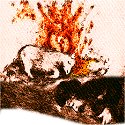
[ This week we begin a new book of Torah, Sefer Vayikra (i.e., the Book of Leviticus)... ]
03.11.18 (Adar 24, 5778) Our Torah portion for this week is Vayikra ("and he called"), the very first section from the Book of Leviticus. In Jewish tradition, Leviticus is sometimes called the "Book of Sacrifices" since it deals largely with the various sacrificial offerings brought to the altar at the Tabernacle. Indeed, over 40 percent of all the Torah's commandments are found in this central book of the Scriptures, highlighting that blood atonement is essential to the Torah. After all, since the revelation of the Tabernacle was the climax of the revelation given at Sinai, the Book of Leviticus serves as its ritual expression, as it is written: "For the life of the flesh is in the blood, and I have given it for you on the altar to make atonement for your souls, for it is the blood that makes atonement (kapparah) by the life" (Lev. 17:11).
Unlike narrative portions of other books of the Torah, the Book of Leviticus begins with the LORD "calling out" (i.e., vayikra: ויקרא) to Moses to explain that the way to draw near to Him is by means of atoning sacrifice. It is noteworthy that throughout the book, only the sacred name of the LORD (יהוה) is used in connection with sacrificial offerings, and never the name Elohim (אֱלהִים). This suggests that sacrificial offerings were given to draw us near to experience God's mercy and compassion rather than to simply appease His anger.... In other words, the Name of the LORD represents salvation (i.e., yeshuah: יְשׁוּעָה) and healing for the sinner, not God's judgment (John 3:17). Indeed, the word korban (קָרְבָּן), often translated as "sacrifice" or "offering," comes from a root word karov (קָרַב) that means to "draw close" or "to come near" (James 4:8). The sinner who approached the LORD trusting in the efficacy of the sacrificial blood shed on his or her behalf would find healing and life...
Note further that the word in the ancient Greek translation of the Torah (called the Septuagint) selected to translate the Hebrew word kapporet (i.e., "mercy seat") is hilasterion (ἱλαστήριον), sometimes translated "propitiation." The New Testament picks up this usage in Romans 3:25: "God put forward Yeshua as a propitiation (ἱλαστήριον) through faith in His blood." In other words, the shedding of Yeshua's blood - represented by His Passion upon the cross - was "presented" upon the Heavenly Kapporet, before the very Throne of God Himself for our atoning sacrifice (i.e., kapparah: כַּפָּרָה) before God.
Word for the Brokenhearted...

03.09.18 (Adar 22, 5778) I am bewildered whenever a Christian advocates "Torah observance" as the way to please God, since the central problem of the human heart is that we cannot do this very thing, and that it is quite impossible to obey even the very first commandment, namely, to love God with all our hearts... If we are honest with ourselves, we will confess that we are inwardly broken, double-minded, even serial hypocrites -- and yet somehow we are led to believe that after we receive the good news of God's love and forgiveness found in Yeshua, we must begin anew to live under the law and to seek God's approval through obedience... No, a thousand times no! Yeshua did not come to "reinvent" Moses but to radically transform our hearts by giving us a supernatural inner nature...
The most profound of illusions is that we "can do this" -- we can "follow Yeshua" and please God by our own efforts, by an act of will, through our own obedience... We think that we are extended grace "to enter in," but after this we are left to our own devices and must generate our own sense of commitment... No. As A.W. Pink once said, "The great mistake made by people is hoping to discover in themselves that which is found in Christ alone..." As I've said before, there is not one gospel message for the sinner and another for the saint. We will always need the life-giving gospel message, which is the word of deliverance spoken now - today - to sinners like us...
The message of the gospel is a "two-edged sword" -- it is indeed "good news" to those who are sin-sick and riddled with guilt and shame, but it is "bad news" for those who deny their inner condition before God and believe that they can justify themselves. In other words, there is no "gospel" message apart from the message of the cross of Yeshua, and the cross represents the end of the ego and its devices. We don't get saved in order to follow the path of self-righteousness; we get saved to be witnesses of God's righteousness... We love God because He first loved us (1 John 4:19). We are sanctified in precisely the same way we are justified - by God's grace alone... There never will be a time when the walk of faith involves what Yeshua has done for me plus something I can bring to the table. "He must increase, but I must decrease" (John 3:30).
Many people get the message of the cross backwards, and I am afraid this is especially true of so-called Messianic believers. "Are you so foolish? Having begun by the Spirit, are you now being perfected by the flesh?" (Gal. 3:3) The message of law is "if you behave, then you belong," which induces an alternating sense of entitlement and despair. The message of the cross is, "if you believe, then you belong." Believe what? In God's love for you - that you are made accepted and worthy because of that love... Paradoxically, by truly accepting that you are accepted -by personally receiving the love of God for your soul - you will find your heart hungering for obedience, and the true intent of the Torah will be written upon your heart.. But note carefully that the Torah will be written upon the broken heart, not the heart of stone... The gospel message is for sinners, not for the self-righteous or for those who think they can "do this thing."
אָנכִי אָנכִי הוּא מחֶה פְשָׁעֶיךָ לְמַעֲנִי
וְחַטּאתֶיךָ לא אֶזְכּר
a·no·khi · a·no·khi · hu · mo·cheh · pe·sha·ey·kha · le·ma·a·ni
ve·cha·to·tey·kha · lo · ez·kor

"I, even I, am He who blots out your transgressions for My own sake
and I will not remember your sins"
(Isa. 43:25)
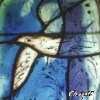
The Circle of Communion...

03.09.18 (Adar 22, 5778) It is written in our Torah that the LORD spoke to Moses 'face to face' (i.e., panim el panim: פָּנִים אֶל־פָּנִים), "as a man speaks to his friend" (Exod. 33:11). During the heartache of his pilgrimage "to the heavenly city" Moses had appealed to the LORD: "You have said to me - yadati'kha ve'shem ve'gam matza'ta chen be'einai - 'I know you by name and you have found grace in my sight...' now therefore, if I have found grace in your sight, please show me now your ways, that I may know you in order to find grace in your sight" (Exod. 33:12-13). I love this roundabout plea of the heart: "If I have found grace in your sight let me know You in order to find grace in your sight." What a beautiful circle of communion: it is all of grace, beginning with God's love, sustained by God's love, and completed by God's love. To know God in the truth, to have "face to face" communion with God, therefore means being able to speak to God freely from the heart, without fear of being rejected or abandoned. "If I have found grace in your sight" – that is, if I am accepted within your heart – then let me know this very thing so that I may find grace in your sight... Moses' appeal was that since God so loved him, then may his heart truly embrace this love so that he could go deeper in his communion with the LORD. Essentially Moses cried out for self-acceptance despite his own sense of radical unacceptability... Moses was given God's assurance. In the passion of his intercession the LORD responded to him: "This very thing that you have spoken I will do" -- ki matzata chen be'einai va'eida'akha be'shem -- "for you have found favor in my sight and I know you by name" (Exod. 33:17).
Shabbat shalom friends... May you draw near to God this hour, trusting ihis heart for you.
The Beginning and End...
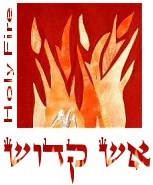
[ The following is related to this week's Torah reading, parashat Pekudei... ]
03.09.18 (Adar 22, 5778) The final portion of the Book of Exodus (i.e., Pekudei) provides details about the construction of the Tabernacle (מִשְׁכָּן) and its furnishings as well as the special clothing of the priests. At the end of the portion we read, וַיְכַל משֶׁה אֶת־הַמְּלָאכָה / "Moses finished all the work" (Exod. 40:33), a phrase that has the same gematria (numeric value) as bereshit (בְּרֵאשִׁית, "in the beginning"), the very first word of the Torah (Gen. 1:1). This suggests that the very creation of the universe was for the sake of the building a dwelling place for God, and by extension, for the sake of the sacrificial love of God to be demonstrated to all of the creation. The Talmud states, "All the world was created for the Messiah" (Sanhedrin 98b) and indeed, Yeshua is called "the Lamb slain from the foundation of the world" in the New Testament (Rev. 13:8; 1 Pet. 1:18-20; Eph. 1:4; 2 Tim. 1:9). "All things were created by Him (i.e., Yeshua), and for Him" and in Him all things consist (συνεστηκεν, lit. "stick together") (Col. 1:16-17). Indeed ff Yeshua it is written: πάντα δι᾽ αὐτοῦ ἐγένετο, καὶ χωρὶς αὐτοῦ ἐγένετο οὐδὲ ἕν. ὃ γέγονεν, "All things came to be through Him, and without Him nothing came to be that exists" (John 1:3). Creation therefore begins and ends with the redemptive love of God as manifested in the Person of Yeshua our Messiah, the great Lamb of God (שֵׂה הָאֱלהִים) and the Savior of the world (מוֹשִׁיעַ הָעוֹלָם). Yeshua embodies the Heart of Creation - the Aleph and Tav (הָאָלֶף וְהַתָּו) - the Beginning and the End (ראשׁ וָסוֹף), and is named as "the One who is, and was, and is to come" (הַהוֶה וְהָיָה וְיָבוֹא), even the LORD God Almighty (Isa. 44:6; Rev. 1:17).
Some of the sages have said that "the seal of God is truth," since the final letters of the three words that conclude the account of creation -- bara Elohim la'asot ("God created to do" [Gen. 2:3]) -- spell the Hebrew word for truth (i.e., emet: אֱמֶת):
 |
The idea that God created the world "to do" implies that He had finished all His work of creation (and redemption) after the sixth day (Heb. 4:3), which is another way of saying that Yeshua is the Lamb slain from the foundation of the world. "All the world was created for the Messiah." Salvation is not an afterthought or "plan B" of God's purpose for creation. "Before Abraham was, I AM." Our LORD Yeshua always is the Way, and the Truth, and the Life for us (John 14:6). As it is written of Messiah: "Worthy are you, our Lord and God, to receive glory and honor and power, for you created all things, and by your will they existed and were created" (Rev. 4:11). Blessed is the Name of the LORD forever and ever....
The Wise Hearted...

03.09.18 (Adar 22, 5778) From our Torah portion this week (i.e., Vayakhel) we read: "Let every wise-hearted person among you come and make all that the LORD has commanded" (Exod. 35:10). Just as God creates the world in chesed (עוֹלָם חֶסֶד יִבָּנֶה), so the wise of heart are able to build up the sanctuary of God. "Love builds up." Being "wise of heart" (חֲכַם־לֵב) means having emotional maturity, humility, and rightly ordered affections. Such heart wisdom does not depend on how smart you are or what sort of education you might have, but rather whether you are able to emotionally comprehend a situation, whether you are willing to allow the heart to discern the inner meaning of a message. The wise of heart are those who "build up" God's kingdom and help provide sanctuary for others...
וְכָל־חֲכַם־לֵב בָּכֶם
יָבאוּ וְיַעֲשׂוּ אֵת כָּל־אֲשֶׁר צִוָּה יְהוָה
ve·khol · cha·kham-lev · be·khem
ya·vo·u · ve·ya·a·su · et · kol-a·sher · tzi·vah · Adonai

"Let every wise-hearted person among you
come and make all that the LORD has commanded"
(Exod. 35:10)

After Moses saw all the work that was done for the building of the Tabernacle, he blessed the people saying, "May it be the will of God that His Presence dwells within the work of your hands" (Exod. 39:33-43; Psalm 90:17). Rashi notes that even if a person feels entirely inadequate for the task, the Torah affirms that he should nevertheless do his or her part. "Every assembly for the sake of heaven must in the end stand" (Avot 4:11). When we apply our hearts to serve God, the Lord will give us the Spirit to empower our way; if we make ourselves his willing vessel, He will fill us to the full.
וִיהִי נעַם אֲדנָי אֱלהֵינוּ עָלֵינוּ
וּמַעֲשֵׂה יָדֵינוּ כּוֹנְנָה עָלֵינוּ
וּמַעֲשֵׂה יָדֵינוּ כּוֹנְנֵהוּ
ye·hi · no·am · Adonai · E·lo·hei·nu · a·lei·nu,
u·ma·a·seh · ya·dei·nu · ko·ne·nah · a·lei·nu,
u·ma·a·seh · ya·dei·nu · ko·ne·nei·hu

"May the beauty of the Lord our God be upon us,
and establish the work of our hands upon us;
yea, establish the work of our hands!"
(Psalm 90:17)

Download Study Card
Water into Wine...
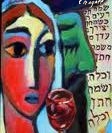
[ This Shabbat is called "Shabbat Parah," the Sabbath of the [red] Cow." In addition to the regular Torah portion (i.e., Vayakhel-Pekudei), we read about the mysterious red heifer sacrifice... ]
03.08.18 (Adar 21, 5778) The first "sign" (σημεῖον) of the Messiah, namely, the miracle of turning water into wine during the wedding at Cana (John 2:1-11), prefigured his teaching about the new covenant and the wedding celebration to come. Yeshua transformed holy water intended for individual purification (i.e., mei niddah [מֵי נִדָּה], the waters that cleanse from contact with death), into a means of celebrating the gift of shared life. Instead of focusing on matters of personal holiness that might separate us, Yeshua brought love and union to the forefront. Morover, during his last Passover Seder with his disciples, Yeshua took the Third Cup, the Cup of Redemption, and sanctified it as the Cup of Betrothal, symbolizing his promise that one day we shall be united to him forever (Rev. 19:7).
It is noteworthy that Yeshua's earthly ministry began amidst betrothal and the celebration of love, and one of his central parables focused on whether people would accept the Father's invitation to join in the wedding celebration for his Son (Matt. 22:2-14). And in the world to come, we will forever celebrate the glory of God's eternal love for us...
The Red Cow Prophecies...
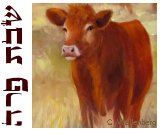
[ This Shabbat is called "Shabbat Parah," the Sabbath of the [red] Cow." In addition to the regular Torah portion (i.e., Vayakhel-Pekudei), we read about the mysterious red heifer sacrifice... ]
03.08.18 (Adar 21, 5778) This Shabbat is the third of four special Sabbaths before Passover during which we read an additional passage from the Torah (i.e., maftir) concerning the Parah Adumah (פָרָה אֲדֻמָּה), or the "Red Heifer" (see Num. 19:1-20). The passage begins: zot chukat ha-Torah (זאת חֻקַּת הַתּוֹרָה), "this is the decree of Torah," which suggests that what follows (i.e., the mysterious ritual of the Red Heifer) is "the seminal decree" of the entire Torah... When we think about the purpose and meaning of the Red Heifer sacrifice, however, we will see that it was intended to cleanse people from contact with death and to restore them from a state of separation. To fulfill this vital decree, however, required sacrificial love, since the priest who performed this service would become defiled (separated) for the sake of the healing of others... In this connection note that the Hebrew word for love is ahavah (אַהֲבָה), which comes from a root verb (יָהַב) that means "to give." Love means giving of yourself to benefit another person (John 15:13). Our Savior and Healer Yeshua the Messiah willingly became unclean on our behalf - through contact with our sin and death - so that we could become clean (Isa. 53:4, 2 Cor. 5:21, Gal. 3:3, Eph. 5:2, Titus 2:14). The pure became impure through His sacrificial offering. Indeed Yeshua, is the perfect fulfillment of the Parah Adumah, since he was completely without sin or defect (2 Cor 5:21; John 8:46); he was sacrificed outside the camp (Heb 13:13); he made himself sin for us (2 Cor 5:21); his sprinkling makes us clean (1 Pet 1:2; Heb 12:24; Rev 1:5); and the "water of separation" that his sacrifice created is the means by which we are made clean from the impurity of sin (Eph. 5:25-6; Heb 10:22). The central decree of Torah, then, which is reckoned beyond our ability to rationally understand, is that God's love is so great that it is willing to become dust and ashes on our behalf so that we might find blessing and life...
The Haftarah read for Shabbat Parah (Ezek. 36:16-38) is ostensibly linked to the sacrifice of the Red Heifer, though on a deeper level it relates to Israel's national salvation and return to the land after the Great Tribulation period.... Despite the horrors of the worldwide Diaspora of the Jewish people and their faithlessness before the nations, God will be true to His word (by causing the Jews to finally accept His salvation (i.e., Yeshua) and to return to the land of Israel. At that time "all Israel will be saved, as it is written, "The Redeemer will come from Zion, he will banish ungodliness from Jacob, and this will be my covenant with them when I take away their sins" (Rom. 11:26-27).
Therefore say to the house of Israel, 'Thus says the Lord GOD (אֲדנָי יהוה): It is not for your sake, O house of Israel (בֵּית־יִשְׂרָאֵל), that I am about to act, but for the sake of my holy Name (לְשֵׁם־קָדְשִׁי) which you have profaned among the nations to which you came. I will sanctify my great Name (קִדַּשְׁתִּי אֶת־שְׁמִי הַגָּדוֹל) which has been profaned among the nations, and which you have profaned among them. And the nations will know that I am the LORD,' declares the Lord GOD, 'when through you I vindicate my holiness before their eyes. I will take you from the nations and gather you from all the countries and bring you into your own land. I will sprinkle clean water (i.e., mayim tehorim: מַיִם טְהוֹרִים) on you, and you shall be clean from all your uncleannesses, and from all your idols I will cleanse you. And I will give you a new heart (i.e., lev chadash: לֵב חָדָשׁ), and a new spirit (i.e., ruach chadashah: רוּחַ חֲדָשָׁה) I will put within you. And I will remove the heart of stone (i.e., lev ha'even: לֵב הָאֶבֶן) from your flesh and give you a heart of flesh (i.e., lev basar: לֵב בָּשָׂר). I will put my Spirit (i.e., ruchi: רוּחִי) within you, and cause you to walk in my statutes (i.e., chukkim: חֻקִּים) and be careful to obey my rules (i.e., mishpatim: מִשְׁפָּטִים). You shall dwell in the land that I gave to your fathers, and you shall be my people, and I will be your God. I will save you (וְהוֹשַׁעְתִּי) from all your uncleanness (i.e., tumah: טֻמְאָה)... (Ezek. 36:22-29)
Despite the various rebukes given by the Hebrew prophets regarding Israel's disobedience -- including the repeated warning of exile from the land -- the prophets never abandoned Moses' original prophecies (Deut. 28:64, 30:3-5) that Israel would one day be fully restored in the land promised to the descendants of Abraham (e.g., Isa. 11:1-9; 12:1-3; 27:12-13; 35:1-10; 43:1-8; 60:18-21; 66:20-22; Jer. 16:14-16; 30:10-18; 31:31-37; 32:37-40; Ezek. 11:17-21; 28:25-26; 34:11-16; 37:21-25; 39:25-29; Hosea 1:10-11; 3:4-5; Joel 3:17-21; Amos 9:11-15; Micah 4:4-7; Zeph. 3: 14-20; Zech. 8:4-8; 10:11-15). Note especially that the prophet Zechariah, in the years following the return from the Babylonian captivity, speaks of a future restoration to the land (Zech. 10:8-12). This most likely refers to the regathering that will follow Yom Adonai, the great Day of the LORD, after the Great Tribulation period, when Yeshua returns to establish His kingdom in Jerusalem at the start of the Millennium.
But what about the present regathering of Israel into the land? In Isaiah 11:11-12:6, a "second" (and worldwide) regathering of Israel is mentioned, but it begs the question of when the first regathering took place. Some have suggested this was the return from the Babylonian Exile (c. 536 BC), though this is unlikely since this was essentially a migration from one country (Babylonia) to another (Judea). As Arnold Fructenbaum has written, "The Bible does not allow for several worldwide regatherings in unbelief; it allows for one worldwide regathering in unbelief; followed by the last one, the one in faith, which is the second one. This text (i.e., Isaiah 11:11-12:6) only permits two worldwide regatherings from the four corners of the earth. Therefore, the present Jewish State is very relevant to Bible prophecy (Fruchtenbaum, Footsteps of the Messiah, p. 102).
As Yeshua clearly taught (e.g., Matt. 24), Israel must both be regathered to her land and functioning as a nation before the Second Coming takes place. When the modern State of Israel was born in 1948, the stage was set for the beginning of the prophesied acharit ha-yamim (אַחֲרִית הַיָּמִים), the "End of Days." This year marks the 70th year of Israel's regathering to the land, a prophetic time for our world...
Seeing the Good...

[ The following is related to our Torah reading for this week, parashat Pekudei... ]
03.07.18 (Adar 20, 5778) We are instructed to see small miracles, everyday "signs and wonders..." The sages say that a verse from our Torah portion suggests that everyone is obliged to recite at least 100 blessings a day: "... a hundred sockets for a hundred talents of silver, one talent per socket" (Exod. 38:27). The Gerer Rebbe comments, "Just as hundred sockets served as the foundation for the sanctuary, so the daily blessings represent the soul's foundation in holiness." In Jewish thinking, we "bless" God by offering our thanks, and thereby consciousness of life is sanctified. The Hebrew term for gratitude is hakarat tovah (הַכָּרַת טוֹבָה), a phrase that means "recognizing the good." The heart looks through the eye, and therefore how we choose to see is a spiritual decision: "If your eye is "single" (i.e., ἁπλοῦς, sincere, focused)," Yeshua said, "your whole body will be filled with light" (Matt. 6:22). When we see rightly, we will behold the radiance of God pervading our way, even in the midst of our mundane affairs (Isa. 6:3). A grateful heart is awake to God's Presence in the little things of life, those small miracles and glories that constantly surround us. And just as the manna would taste according to the gratitude of the person eating, so it is with the inner vision of truth: The good eye of faith sees hundreds of reasons to bless God for the precious gift of life. The LORD is "enthroned among the blessings of His people" (Psalm 22:3).
The sages warn that in the case of doubt, however, one should not make a blessing that invokes God's Name, since doing so violates the commandment not to lift up the Name of the LORD for vain reasons. Ironically enough, those who make an "idol" out of the Name of God are lifting up the name in vain! It is preferable not to pray than to do so insincerely or without heart.... On the other hand, surely God invites our requests, and therefore a prayer offered be'emunah shelemah, with complete faith, will be heard in heaven. As it is written in the New Testament: "And this is the confidence (i.e., παρρησία, freedom to speak honestly) that we have with him, that if we ask anything according to his will he heeds us. And if we know that he heeds us in whatever we ask, we know that we presently have the requests that we have asked of him" (1 John 5:14-15).
If you want to see blessing, then you must open your eyes. The "commandment" here is more of a mitzvah, that is, an opportunity to connect with God's heart -- to become alive and awake! The idea is that you "get to" see the miracle, not that "you must" see it. It is always a choice to believe (Col. 3:15).
Meta-Themes of Exodus...

[ The following is related to this week's Torah reading, parashat Vayakhel-Pekudei... ]
03.07.18 (Adar 20, 5778) The theme of the Book of Exodus essentially turns on two great events, namely, the deliverance of the Israelites from their bondage in Egypt (yetzi'at Mitzraim) and the subsequent revelation given at Sinai (mattan Torah). Both of these events, however, are grounded in the deeper theme of God's faithful love combined with the need for blood atonement. With regard to the former, the blood of the Passover lamb was required to cause death to "pass over" the houses of the Israelites; with regard to the latter, the sacrificial system (i.e., the Mishkan) was required to draw near to God.
Jewish tradition tends to regard the giving of the law at Sinai to be the goal of the entire redemptive process, a sort of "return from exile" to the full stature of God's chosen people. Some of the sages have taken this a step further by saying that God created the very universe so that Israel would accept the Torah. Such traditions, it should be understood, derive more from rabbinical thinking codified after the destruction of the Second Temple than from the narrative presented in the written Torah itself, since is clear that the climax of the revelation at Sinai was to impart the pattern or vision of the Altar to Moses. In other words, the goal of revelation was not primarily to impart a set of moral or social laws (many of which were already expressed in various ancient cultures), but rather to accommodate the Divine Presence in the midst of the people. This is not to suggest that the various laws and decrees given to Israel were unimportant, of course, since they reflect the holy character and moral will of God, unifying the Oneness of God and his power with transcendental moral structure and reality... Nonetheless, it is without question that the Torah was revealed concurrently with the revelation of the Sanctuary itself, and the two cannot be separated apart from "special pleading" and the suppression of the revelation given in the Torah itself... The meticulous account of the Mishkan is given twice in the Torah to emphasize its importance to God. (For more on this, see "The Eight Aliyot of Moses.")
As we consider these things, however, it is important to realize that underlying the events surrounding deliverance and revelation is something even more fundamental, namely, the great theme of faith (אֱמוּנָה). This theme is our response to God's redemptive love. God's love is the question, and our response - our teshuvah - is the answer. The great command is always to "Choose life!" We must chose to turn away from the darkness to behold the Light... Jewish tradition states there were many Jews who perished in Egypt during the Plague of Darkness because they refused to believe in God's love. Likewise, the revelation at Sinai failed to transform the hearts of many Jews because they despaired of finding hope...
As glorious as the redemption and revelation was, then, there was something even more foundational that gave "inward life" to God's gracious intervention. You must first believe that God loves you and regards you as worthy of His love; you must "accept that you are accepted." It is your faith that brings you near... This is the "Cinderella Story" of Exodus.
The themes of Exodus will mean little to you unless you identify with the journey of the people, and that implies that you reckon yourself as worth saving... You must see yourself as the recipient of divine affection and love. After all, without this as a first step, how will you make the rest of the journey? This is similar to the very First Commandment revealed at Sinai: "I AM the LORD your God, who brought you out of the land of Egypt..." Notice that the statement, "I AM the LORD your God" (אָנכִי יְהוָה אֱלהֶיךָ) was uttered in the second person singular, rather than in the plural. In other words, you (personally) must be willing to accept the love of the LORD into your heart, since the rest of the Torah is merely commentary to this step of faith. Therefore the Book of Exodus is called Shemot (שְׁמוֹת), "names," because it sees every person as worthy of God's redeeming love and revelation. "For God so loved the world..." (John 3:16).
Note: For more on this subject, see "Choosing to Belong: Further thoughts on Pekudei."
Presence and Peace...
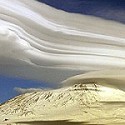
03.06.18 (Adar 19, 5778) The name YHVH (יהוה) means "God is Present" (תָּמִיד בְּכל מָקוֹם) and "God is always near" (תָּמִיד לְיַד) - as close as your own heart. The LORD is near, even should you feel lost and far away.... We can attune ourselves to hear God's "still, small voice" (קוֹל דְּמָמָה דַקָּה) when we are quieted, not when we are surrounded by the crowd and its cheers or its murmurings. God cannot be found in noise and restlessness, much less in the fear-mongering and noise of this world. "God is the friend of silence. See how nature - trees, flowers, grass- grows in silence; see the stars, the moon and the sun, how they move in silence... We need silence to be able to touch souls." For thus said the Lord GOD, the Holy One of Israel, "In returning and rest you shall be saved (בְּשׁוּבָה וָנַחַת תִּוָּשֵׁעוּן); in quietness and in trust (בּהַשְׁקֵט וּבְבִטְחָה תִּהְיֶה גְּבוּרַתְכֶם) shall be your strength" (Isa. 30:15).
הַרְפּוּ וּדְעוּ כִּי־אָנכִי אֱלהִים
אָרוּם בַּגּוֹיִם אָרוּם בָּאָרֶץ
har·pu · u·de·u · ki · a·no·khi · E·lo·him
a·rum · ba·go·yim · a·rum · ba·a·retz

"Be still and know that I am God,
I will be exalted among the nations, I will be exalted in the earth."
(Psalm 46:10)

Hebrew Study Card
"Be still and know (הַרְפּוּ וּדְעוּ) that I am God, I will be exalted among the nations, I will be exalted in the earth." Note that the Hebrew verb translated "be still" (i.e., rapha: רָפָה) means to let go, to stop striving, to relinquish control, and to surrender your life and indeed the fate of the world to the care of God... "Being still" means finding serenity and inner peace by completely trusting in God's providential plans for good... As it says in our Torah: hityatzevu u'reu et yeshuat Adonai (הִתְיַצְבוּ וּרְאוּ אֶת־יְשׁוּעַת יְהוָה): "Stand firm and see the salvation (i.e., Yeshua) of God" (Exod. 14:13). As Pascal said, "All men's miseries derive from not being able to sit quietly in a room alone." This is because many people cannot live with themselves and seek escape; they therefore are compelled to seek release through the buzz and noise of what lies outside of themselves.... God is not the author of confusion: We experience the Spirit of God by receiving heavenly peace: "Stop your striving and know that I am God."
One of the Ten Commandments is to rest in the LORD your God (Exod. 20:8-11), which is a picture of the "set table" the LORD provides for us as his children. The deepest principle of Sabbath is that we are set free from our striving and can open our hearts to God's gracious love... "Salvation is of the LORD," and we rest in the what the Lord has done for us. "If you call the Sabbath a delight; if you honor it, then you shall take delight in the LORD, and I will make you ride on the heights of the earth; I will feed you with the heritage of Jacob your father, for the mouth of the LORD has spoken" (Isa. 58:13-14).
Wisdom of the Heart...
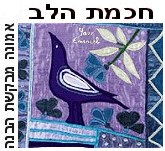
[ The following is related to this week's Torah reading, Vayakhel-Pekudei... ]
03.06.18 (Adar 19, 5778) From our Torah portion this week (i.e., parashat Vayakhel) we read: "Let every wise-hearted (חֲכַם־לֵב) among you come and make all that the LORD has commanded" (Exod. 35:10). The sages comment that none of the people actually had the skills to fashion the glorious things of the sanctuary, but they had something even better – a passionate desire to do God's will, and this enabled them to access God's help to do what was needed. The purpose of the commandment was to involve the heart, to refine the character: "And everyone whose heart moved him brought what was needed…" (Exod. 35:22). God could have created the sanctuary "yesh me'ayin," out of nothing, but he wanted the heart of his people to express their desire for his presence in their midst. The same is true for the inner sanctuary of our hearts...
The beginning of wisdom is the awe of the LORD (Psalm 111:10), that is, relating to reality with reverence and learning to distinguish what is sacred. Note that God does not build the mishkan directly, but allows us to bring our heart and creativity to the task. Practically speaking being chacham-lev, "wise of heart," means knowing what you must do to help reveal divine beauty in the world.
רֵאשִׁית חָכְמָה יִרְאַת יְהוָה
שֵׂכֶל טוֹב לְכָל־עשֵׂיהֶם
תְּהִלָּתוֹ עמֶדֶת לָעַד
reishit · chokh·mah · yir·at · Adonai
se·khel · tov · le'khol · o·se·hem
te·hil·la·to · o·me·det · la'ad

"The awe of the LORD is the beginning of wisdom;
all those who practice it have a good understanding:
His praise stands forever."
(Psalm 111:10)

The Power of God...

03.05.18 (Adar 18, 5778) People confuse morality with religion, saying things like, "if I do good, the rest will take care of itself," but Yeshua did not come to simply teach (or reinforce) moral truth, but to die for our sins and to transform our nature. The message of the cross is not that we should reform ourselves with renewed hope, but rather that our old nature must die and be replaced with something far greater... When King David cried out to the Lord, "Create in me a clean heart, O God," he did not use the Hebrew word yatzar (יָצַר), which means to "fashion" or "form" something from pre-existing material (Gen. 2:7), but he instead used the word bara (בָּרָא), a verb exclusively used in the Torah to refer to God's direct creation of the cosmos (Gen. 1:1). In other words, King David understood that no amount of reformation of his character would be enough, and therefore he appealed to that very power of God that alone could create yesh me'ayin, or "out of nothing." Such was the nature of the remedy required that was fulfilled in the cross of Messiah...
לֵב טָהוֹר בְּרָא־לִי אֱלהִים
וְרוּחַ נָכוֹן חַדֵּשׁ בְּקִרְבִּי
lev · ta·hor · be·ra·li · E·lo·him,
ve·ru·ach · na·khon · cha·desh · be·kir·bi

"Create for me a pure heart, O God,
and renew a right spirit within me"
(Psalm 51:10)

Hebrew Study Card
Yeshua taught, "Blessed are the pure in heart, for they shall see God" (Matt. 5:8). The Greek word translated "pure" is katharos (καθαρός), sometimes used describe the cleansing of a wound (catharsis), or to describe the unalloyed quality of a substance revealed through refining fire. Metaphorically, then, purity of heart refers to separation from the profane - singleness of vision, wholeheartedness, passion, and focused desire for the sacred. Faith is a great trembling of love: "With this ring I do worship thee..." As we center our affections on Yeshua, we become pure in heart -- i.e., unified, made whole, and healed of our inner fragmentation. We see the Lord both in this world, through his effects, and then panim el panim (פָּנִים אֶל־פָּנִים), "face to face," in the world to come. Our hope purifies us for that coming great day of full disclosure (1 John 3:2-3; Heb. 12:14).
Seeing your New Face...
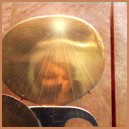
[ The following is related to this week's Torah reading, parashat Vayakhel... ]
03.05.18 (Adar 18, 5778) At the entrance of the Mishkan (i.e., Tabernacle) stood a gleaming copper "laver," the place where we wash and prepare ourselves to come before the Divine Presence (Exod. 30:18). The Torah says the basin was made from the mirrors of women who offered them to help build the sanctuary (see Exod. 38:8). Spiritually understood, the mirror was transformed from a place where we encounter our own appearance to a place where we encounter God. As you behold the altar of sacrifice your image was reflected as the recipient of atonement... Instead of focusing on our superficial face – how it looks and how we esteem ourselves - we now see ourselves in light of God's love, with our former self-image "sacrificed" or surrendered for the gift of a deeper self (2 Cor. 5:16). This is the "new self" cleansed by the Word of God, reflecting back the radiance of His Presence, as it says: "put on the new self (הָאָדָם הֶחָדָשׁ) created after the likeness of God in true righteousness and holiness" (Eph. 4:24). The sacrificed mirror represents turning to face reality, to see ourselves as God see us... Because of Yeshua, we have access to the inner heart of God (Heb. 4:16). Know who you are in Messiah: "And we all, with unveiled face, beholding the glory of the Lord, are being transformed into the same image from one degree of glory to another. For this comes from the Lord who is the Spirit" (2 Cor. 3:18).
Accounting for the Lamb...

03.05.18 (Adar 18, 5778) In our Torah portion for this week (i.e., Vayakhel-Pekudei) we learn that Moses consecrated the Mishkan (Tabernacle) on Rosh Chodashim, "the first day of the first month of the second year [since the Exodus]" (Exod. 40:17). Note that this date (i.e., Nisan 1) marks the start of the Biblical year and the month of the Passover redemption (see Exod. 12:1-12). The Torah's calendar therefore begins with the advent of the Lamb of God, just as the central sacrifice of the Tabernacle was the daily sacrifice (i.e., korban tamid: קָרְבַּן תָּמִיד) of a defect-free male lamb offered with unleavened bread and wine. The LORD calls this "My offering, My bread..." (see Num. 28:1-8). In other words, the service and ministry of the Tabernacle constantly foreshadowed the coming Lamb of God who would be offered upon the altar "made without hands" to secure our eternal redemption (Heb. 9:11-12).
As mentioned before, the climax of the Torah given at Sinai was the revelation of the Tabernacle. The tablets of the law, summarizing the Ten Commandments, were stored inside the Ark of the Covenant (אֲרוֹן בְּרִית־יְהוָה), the innermost place of the Tabernacle, a sacred "three-in-one" box. As such, the ark served as a symbol of kisei ha-kavod (כִּסֵּא הַכָּבוֹד), the Throne of Glory. It stood entirely apart as the only furnishing placed in the Holy of Holies (קדֶשׁ הַקֳּדָשִׁים). Upon the cover of the Ark (i.e., the kapporet) were fashioned two cherubim (i.e., angel-like figures) that faced one another (Exod. 25:17-18). According to the Talmud (Succah 5b), each cherub had the face of a child - one boy and one girl - and their wings spread heavenward as their eyes gazed upon the cover (Exod. 25:20). God's voice would be heard only in the midst of innocence, humility, purity, and hope... Each year during Yom Kippur, sacrificial blood was sprinkled seven times over the cover of the Ark to symbolize the covering of the law's demand and the atonement of sin secured through Messiah.
Mirror of Forgiveness...

03.04.18 (Adar 17, 5778) "Forgive us our sins, for we ourselves forgive everyone who is indebted to us" (Luke 11:4). Before offering personal prayer to the LORD, it helps to make the declaration: "Master of the universe, I hereby forgive anyone who might have hurt me this day, either physically or emotionally, whether accidentally on intentionally, inadvertently or deliberately, by speech or by deed, whether against my honor or anything else that is mine. May no one be punished because of me. Help me to overlook the faults of others and to always use the good eye, regarding them as You do... And I ask You to forgive me, too, for my many wrongdoings and failings. May it be Your will, Lord my God and God of my fathers, that I sin no more nor repeat my sins, neither shall I again anger You nor do what is displeasing in Your eyes. The sins I have committed, please erase in Your abounding mercies for the sake of Your Son, Yeshua the Messiah, my Savior and LORD. Amen."
"Forgive us... as we forgive...", which means that our forgiveness of others (including ourselves) is the measure of our own state of forgiveness, "for with the measure you use it will be measured back to you" (Luke 6:38). This is the great "like-for-like" principle of the spiritual life: As you give, so you will be given; as you withhold, so you will be withheld (Psalm 18:25-27). If we cling to resentment, anger, bitterness, or a desire for revenge, we appeal to principles of justice that alienate us from reconciliation with others. But if we intend to have God be the Judge of others, we thereby appeal to Him to be our own Judge as well. If we merely hear this truth but fail to practice it, we are like someone who looks at their face in a mirror but soon forgets "what manner of man he was," that is, by overlooking the truth about his inward condition (James 1:22-24). Just as someone who looks in a mirror but forgets the impression, so the someone who merely hears the Word soon forgets its point... "Hear the end of the verse," that is, listen to know how we must practice our faith. And just as grace is inaccessible for someone who refuses to be honest with himself, so is forgiveness. If a person refuses to confess the truth about his condition, salvation itself is impossible, since God literally cannot save the soul that denies its need for Him. We must accept others as we accept ourselves - as broken people who are redeemed and loved by God Himself. There are no exceptions to this "life-for-like" principle of the Spirit.
"Forgive us our sins, for we ourselves forgive everyone who is indebted to us" (Luke 11:4). Note the phrase, "every one who is indebted" (παντὶ ὀφείλοντι ἡμῖν). The Lord likens our sin to a debt owed to Him... Some things never ought to have been done, but when they are done, they are "stolen" from God, by abusing His sustaining energy and resources. When we sin, God enables us to do so at His expense, so to speak, though this is a "debt" owed to Him as the Master of the Universe and LORD of Glory. May our LORD help each of us to let go and be free of those things that ensnare us through offence...
"May it be Thy will, O Lord our God and God of our fathers, to remove all barriers between us, and to endow us with the vision to see the good in all people - including ourselves - and to graciously overlook their defects and shortcomings." As Francis of Assisi once rightly prayed: "Lord, make me an instrument of Your peace. Where there is hatred, let me sow love; where there is injury, pardon; where there is doubt, faith; where there is despair, hope; where there is darkness, light; where there is sadness, joy... O, Divine Master, grant that I may not so much seek to be consoled as to console; to be understood as to understand; to be loved as to love; For it is in giving that we receive; it is in pardoning that we are pardoned; it is in dying that we are born again to eternal life." Amen.
Sabbath of the "Red Cow"
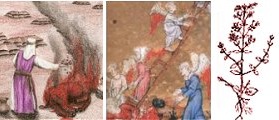
[ This Shabbat is called "Shabbat Parah," the Sabbath of the [red] Cow." In addition to reading the regular Torah reading (i.e., Vayakhel-Pekudei), we read about the red heifer sacrifice.... ]
03.04.18 (Adar 17, 5778) The Shabbat that immediately follows the festive holiday of Purim is called Shabbat Parah (שבת פרה) - the "Sabbath of the [red] Cow," when we read in the Torah about the special sacrifice of the mysterious "Red Heifer" (Num. 19:1-22). The early sages decided to recite the laws of the Red Heifer at this time to recall the remedy of the sin of the Golden Calf mentioned in our Torah portion last week (i.e., parashat Ki Tisa), and to remind the people to purify themselves before coming to Jerusalem for the great pilgrimage festival of Passover. It is thought that since the sprinkling of the "waters of separation" cleanses from the uncleanness of death, the reading this portion would help prepare our hearts for the time of Passover when we celebrate deliverance from death.
The Red Heifer offering is considered a paradox to many Jewish thinkers, though it can be seen as a revelation of the Yeshua our Messiah. The paradox is that the one who offers this sacrifice becomes ritually impure, while the sprinkling of the ashes is used to make people clean... The ritual is considered chok within the Jewish tradition, meaning that it makes no rational sense. The Talmud states that of all the 613 commandments given in the Torah, even King Solomon with all his wisdom could not fathom this decee. However, the sacrifice of Yeshua the Messiah can be understood as the fulfillment of the symbolism of the parah adumah. Both were entirely rare and without defect (sin); both were sacrificed "outside the camp"; both made the one who offered the sacrifice unclean but made the one who was sprinkled by it clean; and finally, both sacrifices cleanse people for priestly service.
The Lord required that the parah adumah (i.e., Red Heifer) had to be a perfect specimen that was completely red, "without blemish, in which there is no defect (mum)." The early sages interpreted "without blemish" as referring to the color, that is, without having so much as a single white or black hair. This is the only sacrifice in the Torah where the color of the animal is explicitly required. Moreover, the parah adumah was never to have had a yoke upon it, meaning that it must never have been used for any profane purposes.

Unlike all other sacrifices offered at the altar, the parah adumah was taken outside the camp and there slaughtered before the priest, who then took some of its blood and sprinkled it seven times before the Mishkan (thereby designating it as a purification offering). [During the Second Temple period, the High Priest performed this ceremony facing the Temple while atop the Mount of Olives.] Then the red heifer would be burned in its entirety: its hide, flesh, blood, and even dung were to be burned (unlike other Levitical korbanot). Unlike other offerings, all the blood of the sacrifice was to be burned in the fire.
Hyssop, scarlet yarn, and a cedar stick would then be thrown upon the burning parah adumah (note that these are the same items used to cleanse from tzara'at, skin disease). In other words, the blood was assimilated into the ashes of the sacrifice, which were then gathered and mixed with water to create the "water of separation" (mei niddah) for the Israelite community. Note that the word "separation" (niddah) refers to menstrual impurity and harkens to Zech. 13:1: "On that day there shall be a fountain opened for the house of David and the inhabitants of Jerusalem, to cleanse them from sin and from niddah."
Anyone (or anything) that came into contact with a corpse (the ultimate embodiment of sin and death) was required to be purified using the mei niddah. The purification procedure took seven days, using stalks of hyssop dipped into the water and shaken over the ritually defiled person on the third day and then again on the seventh day. After the second sprinkling, the person undergoing the purification process would be immersed in a mikvah and then be unclean until the following evening.
According to Jewish tradition, the Red Heifer sacrifice was to atone for the sin of the Golden Calf, though the Torah itself does not make this association. The LORD Yeshua, our High Priest of the New Covenant, is the perfect fulfillment of the Parah Adumah, since he was completely without sin or defect (2 Cor 5:21; John 8:46); he was sacrificed outside the camp (Heb 13:13); he made himself sin for us (2 Cor 5:21); his sprinkling makes us clean (1 Pet 1:2; Heb 12:24; Rev 1:5); and the "water of separation" that his sacrifice created is the means by which we are made clean from the impurity of sin (Eph 5:25-6; Heb 10:22).
For more on the Red Heifer sacrifice, see the "Gospel of the Red Cow" article.
Vayakhel-Pekudei (ויקהל־פקודי)
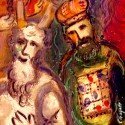
[ This week we have a "double portion" of Torah: parashat Vayakhel and Pekudei... ]
03.04.18 (Adar 17, 5778) This week we have a "double portion" of Torah: parashat Vayakhel-Pekudei (ויקהל־פקודי). Much of this material is repeated from the earlier description of the Tabernacle (מִשְׁכָּן) to underscore the importance of the sacrificial system (the altar) and to portend the two advents of Messiah Yeshua. Note that God commanded Moses to assemble the Tabernacle on "the first month in the second year [from the date of the Exodus], on the first day of the month" (i.e., Nisan 1, or Rosh Chodashim, see Exod. 40:17). The new moon of Nisan, then, marks the beginning of month of redemption, both regarding the Exodus from Egypt (and the establishment of the altar at the Tabernacle), as well as the greater Exodus given through the altar of Messiah as spiritually foretold by this.
Indeed once the Mishkan ("Tabernacle") was completed and all its components were accounted for and inspected, Moses assembled it and anointed all its components with the sacred anointing oil, called shemen ha-mishchah (note that the word "mishchah" (מִשְׁחָה) comes from the same root as "Messiah" (מָשִׁיחַ), indicating that the Mishkan would foreshadow God's plan of redemption given in Yeshua). Moses then formally initiated Aaron and his four sons into the priesthood, marking their hands and feet with sacrificial blood and "waving them" before the Lord to picture resurrection. The Divine Presence - manifest as the Shekhinah Cloud of Glory – then filled the Holy of Holies in the Tent of Meeting.
The Book of Exodus ends: "And Moses was not able to enter the Tent of Meeting because the cloud settled on it, and the Glory of the LORD (כְּבוֹד יְהוָה) filled the Mishkan (הַמִּשְׁכָּן). Throughout all their journeys, whenever the Cloud was taken up from over the Mishkan, the people of Israel would set out. But if the Cloud was not taken up, then they did not set out till the day that it was taken up. For the Cloud of the LORD (עֲנַן יְהוָה) was on the Mishkan by day, and Fire was in it by night, in the sight of all the house of Israel throughout all their journeys" (Exod. 30:35-38).
The Presence of the Glory of God that descended from Sinai upon the newly dedicated Mishkan represented a climactic moment for the fledgling nation, since the Sin of the Golden Calf had jeopardized whether the God would indeed dwell within the midst of the camp of Israel... Recall that it was only after Moses had returned from Sinai bearing the second set of Tablets (on Yom Kippur) that the glow of the LORD's redeeming love radiated from his face, and new hope was given to Israel (prefiguring the New Covenant). The King of Glory would accompany the people from Sinai to the Promised Land! (The narrative continues in the Book of Numbers, beginning exactly one month after the Mishkan was assembled.)
Praise Report: Thank you all for your prayers.... I was in so much pain I couldn't stand still and felt like I would vomit; then after asking for prayer I was able to not only endure but forgot the pain entirely -- so much so that I was able to do the "Shavuah Tov" for this week's Torah without distraction. Indeed the pain began to subside a couple hours after I posted my prayer request to you. My son Judah is also doing much better as well. Praise the LORD our Healer: Adonai Rofeinu! (יהוה רפאנו). Thank you again for your compassion and concern, friends, and may the LORD God of Israel bless you always.
Sorrowful yet Rejoicing...

03.02.18 (Adar 15, 5778) It is written that "a joyful heart (לֵב שָׂמֵחַ) is good medicine" (Prov. 17:22). Where it says, "Serve the LORD with gladness" (Psalm 100:2), the sages note that "with gladness" (בְּשִׂמְחָה) contains the same letters as the word "thought" (מַחֲשָׁבָה), which suggests that happiness is found by thinking worthy thoughts. As the apostle admonished: "Think on these things" (Phil. 4:8). We find spiritual happiness when we choose to be thankful. This is called hakarat tovah (הַכָּרַת טוֹבָה), a phrase that means recognizing or being aware of the good. Therefore cultivate a sense of wonder. Look at the sky often, for it is the "daily bread of the eyes." Albert Einstein once said, "There are two ways to live your life; one is as though nothing is a miracle, and the other is as though everything is." Happiness is ultimately a choice, a decision to see the good (or to at least believe in the good), to open our eyes to wonder, and to turn away from negative, fearful visions. The Torah of the LORD rejoices the heart (Psalm 19:8); let the heart of those who seek the LORD be glad (Psalm 105:3). Amen, let it be, Lord, even in the midst of our struggles.
Trusting His Heart...

[ The following is related to our Torah reading this week, parashat Ki Tisa... ]
03.02.18 (Adar 15, 5778) If you can't detect God's hand in your circumstances, then trust His heart... Gam zu l'tovah (גַּם זוּ לְטוֹבָה): "This too is for the good." Whenever I am confused about life (which is often), I try to remember what God said to Moses after the tragic sin of the Golden Calf: "I will make all my goodness pass before you and will proclaim before you my Name, 'The LORD' (יהוה). And I will be gracious to whom I will be gracious, and will show mercy on whom I will show mercy" (Exod. 33:19). God's character does not change: the LORD is the same "yesterday, today, and forever." The meaning of the Name, however, cannot be known apart from understanding the heart's need:
יְהוָה יְהוָה אֵל רַחוּם וְחַנּוּן
אֶרֶךְ אַפַּיִם וְרַב־חֶסֶד וֶאֱמֶת
Adonai Adonai El Ra·chum ve·chan·nun
e·rekh ap·pa·yim ve·rav che·sed ve·e·met

"The LORD, the LORD, a God merciful and gracious,
slow to anger, and abounding in steadfast love and faithfulness."
(Exod. 34:6)

Download Study Card
Earlier God had revealed to Moses that the Name YHVH (יהוה) means: "He is Present" (i.e., the word is a play on the Hebrew verb hayah [הָיָה], "to be"), and therefore God is "always there" (Exod. 3:14). The great I AM (אֶהְיֶה) means God stands outside of the constraints of time, "one day is as a thousand years" and "a thousand years as one day" before Him (2 Pet. 3:8). Just as a thousand years is but "a watch in the night" (Psalm 90:4), so one day is as a thousand years. God's Spirit broods over all things and sustains the entire universe. God is "necessary being," the Source of Life, and foundation for all other existence. God's creative love and power sustain all things in creation...
Now while the idea that God is the Source of all life in the universe is surely important, it is not entirely comforting, especially in light of man's guilt and anxiety over death. After all, we do not stand before the "god of the philosophers," but rather the personal God of Abraham, Isaac, and Jacob. The meaning of the Name YHVH - that He is merciful, gracious, slow to anger, abounding in love and truth, and so on - therefore presents additional revelation in face of man's inherent brokenness and spiritual need (Exod. 34-6-7). This is the Name of God revealed in compassion and forgiveness -- the "New Covenant" name of God, since the meaning of YHVH was fully given in Shelosh Esrei Middot of God's mercy.... Some things in life are only known in the passion of faith... things like love, beauty, honor, and so on. The Name of the LORD as the Compassionate One is only known in humility, when all human pretense is stripped away and the inner life is laid bare in its desperate need. The Name YHVH is God's response to the heart's cry for deliverance, for compassion, for mercy....
What is God like - what is His heart - is the first question, and how we answer that will determine how we deal with all the other questions that come up in theology... What do you feel inside when you stare up at the ceiling before you go to bed? In light of the ambiguity and heartaches of life we might wonder if God is there for us. Does God care? Is He angry at me? Does He really love me? This is the raw place of faith, where we live in the midst of our questions. The Name YHVH (יהוה) means "He is present," even when we are unconscious of His Presence in the hour of our greatest need; and the Name YHVH (יהוה) also means "God is Love," the Breath of life and the essence of all our hope... For more on this topic, see "Trusting God's Heart: Further thoughts on Ki Tisa."
Personal Prayer request:
I recently broke a tooth and now there is an infection that affecting the nerve. Unfortunately I can't be treated for this until next Monday evening, which means I am going to have to "tough it out" over Shabbat tonight and throughout the weekend. Please pray that I can withstand the pain and get the tooth repaired without undue complication. Thank you so much, and Shabbat Shalom to you all.
Builder of the House...
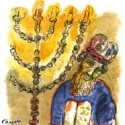
[ The following is related to our Torah reading this week, parashat Ki Tisa... ]
03.02.18 (Adar 15, 5778) Our Torah portion this week (Ki Tisa) states that God endowed a man named "Betzalel" with the Spirit of God (רוּחַ אֱלהִים), and with wisdom (חָכְמָה), understanding (תְּבוּנָה), and knowledge (דַּעַת) - the same attributes used to describe God as the Creator of the Universe (Exod. 35:31; Prov. 3:19-20). Indeed, the name Betzalel (בְּצַלְאֵל) means "in the shadow of God" (from בְּ [in] + tzel [צֵל], "shadow" + El [אֵל], "God") who "foreshadowed" Messiah in that 1) he was from the kingly tribe of Judah, 2) he was a young carpenter, 3) he was unusually "filled with the Spirit of God," 4) his father's name (Uri) means "my light" (James 1:17), 4) his assistant was called Oholiav (אָהֳלִיאָב), a name that means "my Father's tent," and 5) it was Betzalel (rather than Moses) who actually built the Mishkan, which was the pattern for the spiritual House of God (Heb. 3:3-6; 1 Pet. 2:5). Indeed, as the one who fashioned the "Ark of the covenant" where the blood would be presented for our atonement, Betzalel foresaw the message of the redemption of Messiah.
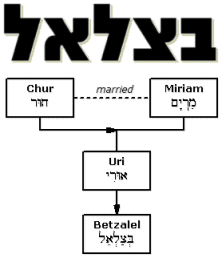 |
Note: For more on this topic, see the "Betzalel and the Messiah" article.
Theology, Paradox, and Purim...
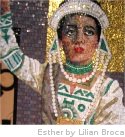
03.01.18 (Adar 14, 5778) The theme of the holiday of Purim (פּוּרִים) is the providential survival of the God's people despite various attempts by their enemies to destroy them. As such, Purim (like Passover) is a celebration of the deliverance and faithfulness of the LORD God of Israel. The terrible irony of the anti-Semite is that he hangs himself using his own rope... The tragic character of Haman, then, represents the Biblical archetype of all those who refuse to acknowledge God's faithful love for the his people....
On the Torah's calendar, both the last month of the year (Adar) and the first month (Nisan) center on the theme of God's salvation. In Adar we celebrate Purim, and 30 days later we celebrate Passover... However Purim, unlike Passover, celebrates the "hiddenness" of God's actions. There is no dramatic power encounter; no parting of the Red Sea, no cataclysmic judgments regarding Purim. This is suggested by the name of the Book of Esther itself, Megillat Ester (מְגִלַּת אֶסְתֵּר), since the word megillah ("scroll") is related to the word giluy (גִּלּוּי), "revelation," and the name Esther is related to the word hester (הֶסְתֵר), meaning "hiddenness." The phrase hester panim (הֶסְתֵר פָּנִים) means "hiding of face" and is often used when discussing the role of God in the Book of Esther. God's plan is being fulfilled, step-by-step, even if it is hidden within the "natural" world of human beings and their choices (Jer. 10:23; Prov. 21:1). For more on this subject, see "Theology, Paradox, and Purim."
|












































